Note
Hi, i noticed that i havent seen you post in a while. Are you okay?
Much love💙🩵
Hey Anon,
Thank you!! I'm good, I am just rushing a few real life deadlines, which I unfortunately must do so I can afford the MPW boxset 🤣🤣🤣
I will be back once I'm done!
Thank you for the love 🥰🥰
10 notes
·
View notes
Text
my observations and take on some nuances not conveyed in translation
my drawn out summary part 2!
*Disclaimer: I'm not critiquing existing translations, I think the translators have done a phenomenal job! Just wanted to add my 2 cents worth.
Part 1
Language Use in Kiseki
Ep 4 Cont
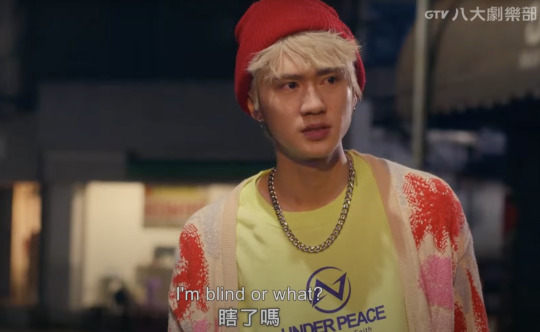

More tears. This scene hurts so bad. Ai Di actually says "Blind or what? Having followed him for so long, it's not as though unaware of whom he likes..." It's difficult to translate these lines because there are no first person pronouns used. On one hand, it's Ai Di scolding himself for holding on to his unrequited feelings for Chen Yi (seen in the translation above). On the other hand, he is also scolding Chen Yi for the same thing with regards to CDY.
Ep 5
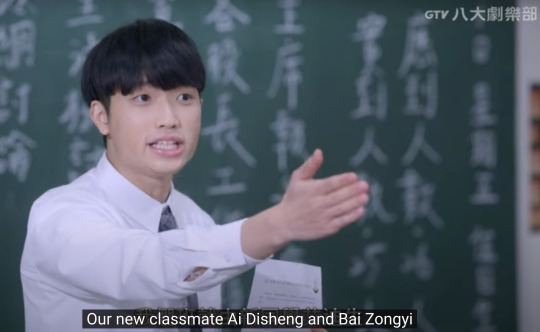
Time for some comedy to soothe the angst. Our boy really went to school punning and naming himself Edison (and I think the intent was with Thomas Edison in mind lmao).
Ep 8
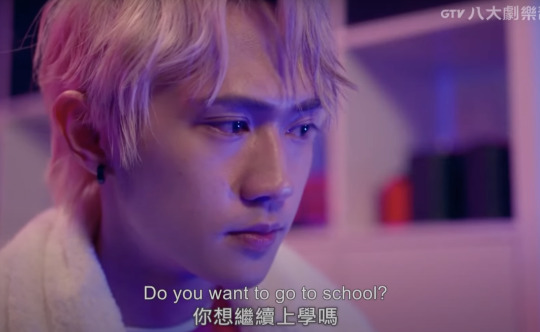
There's so much we don't know about Ai Di. Here Chen Yi actually asks if Ai Di wants to return to school. Coupled with how Ai Di deflected and told him to stop joking around, and how he told Zong Yi he doesn't need to attend school because he's a genius, it suggests that Ai Di has some regrets about not having the normal life peers his age lead.
Ep 9 💔
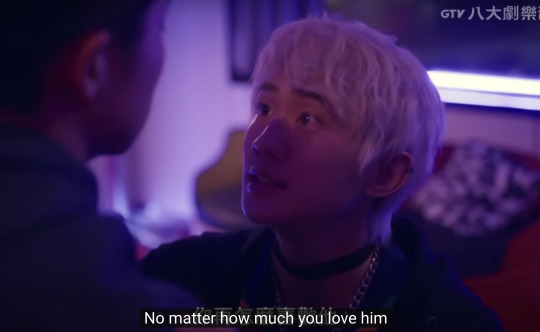
This was the most heartbreaking scene imo. Here Ai Di says "你再怎么喜欢他,你再怎么努力,他看的永远不会是你。" - "No matter how much you like him, no matter how hard you try, the one he looks at will forever not be you." While it's clear it's directed at Chen Yi, to a degree it's also Ai Di directing it at himself.
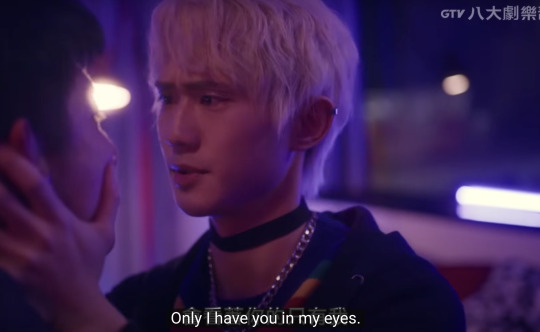
He goes on to say "会看着你的他妈只有我。" 他妈 is a vulgarity (essentially meant to insult someone's mother) which the subtitles and translation have censored, and this line translates into "The only fucking person who will look at you is me."
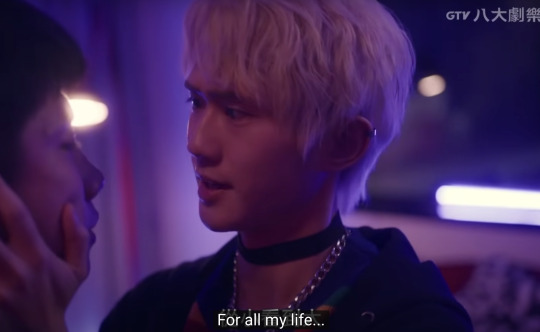
Let's make it angstier. Ai Di says "只有我,从小看到大。我蠢,我猪。", which has been translated into "Only I, for all my life...I'm such a stupid fool". The translation is fine but it doesn't reflect just how vulnerable Ai Di was in this moment, as though he heart was breaking right alongside Chen Yi’s. My translation would be "Only I, since I was young till now when I am old, have been looking at you. I'm naive. I'm foolish."
This is the line that has made me teared every single rewatch. Ai Di isn't stupid but he is aware that he is being foolish, chasing so desperately all his life after someone who doesn't see him as anything more than a brother .
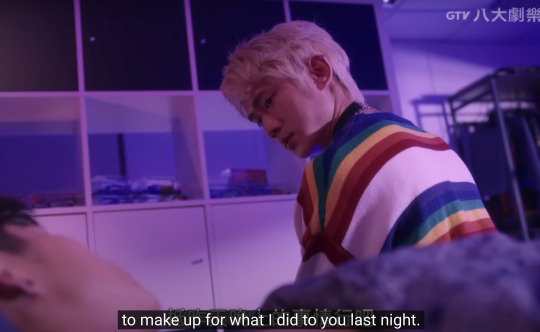
Ai Di regrets and he says "这件事我帮你扛,抵昨天晚上的事情行吧。我说行就行。" which has been translated into "I'll take the blame for you to make up for what I did to you last night. It's a deal." I felt it was more of a resigned question Ai Di poses, "I'll carry the blame for you, to make up for yesterday night's affair, alright? If I say that's fine, then it's fine."

I was surprised to see this! Here, because Ai Di will not follow willingly, Chen Yi picks him up, and he purposely steps over the pot of burning coal on Ai Di's behalf. I'm not too sure if it's a Chinese thing or religion thing, but in my home country, some Chinese (esp the older folks) say that upon returning home after incarceration, one has to step over burning coal to wash away the bad luck. Very neat that they included this custom!
The same thing Ai Di tells Zong Yi not to say "再见" - see you again; they wouldn’t want to see prison again (which has been translated into goodbye).
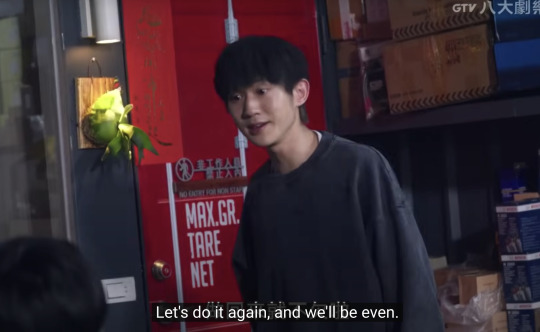
This is why people think ChenAi switch, also courtesy of Hsu Kai who pointed this line out. Ai Di says "做回来就不欠啦" which translates into "Do it back and I'll no longer owe you". (more context in comments)
Ep 10
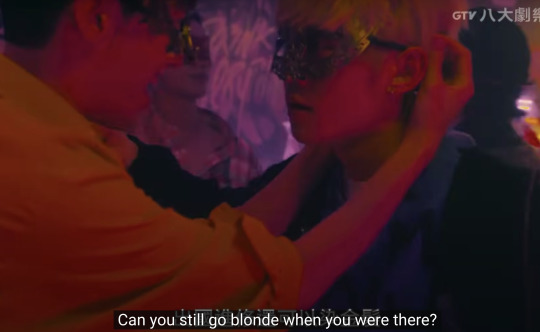
Matt Lee's character who was Ai Di's friend at the bar before jail mentions that Ai Di even dyed his hair blonde upon going overseas to further his education. Meaning, Ai Di's friends were told that he was schooling overseas when he was actually in prison 😢
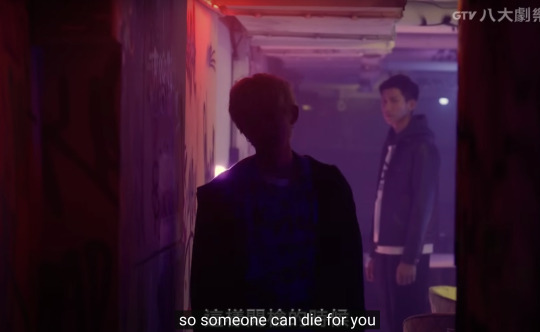
Ai Di tells Chen Yi "应该多培养一些人在你旁边了,被开枪的时候,才有人帮你垫背" which translates into "You should cultivate relationships so more people will be by your side, so that when the gun is fired, there will be someone to take the bullet for you". Ai Di's done it once, he doesn't want to do it again. And Chen Yi smiles weakly after Ai Di says this because Ai Di just confirmed that he went to jail in Chen Yi's stead.
Ep 11

Like Xiao Jie says, Chen Yi really sucks at wooing someone, so much so that even Xiao Jie is better. On receiving the signature, Ai Di asks if Chen Yi thinks he is BTS (bangtan) and that he can sell his autograph 😂
Ep 12

Chen Yi says "我是在你离开之后,我才发现自己真正喜欢的是你" which has been translated into "It's true I realised you are the one with whom I'm in love while you were gone." I would prefer if it had been "It was only after you left that I realised the one whom I actually love is you". Keyword 真正 - really/actually.
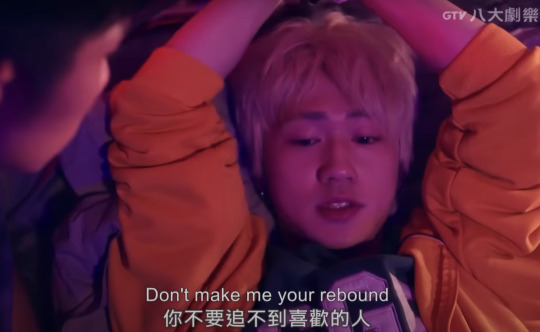
Ai Di uses more heart-rending words. Instead of "Don't make me your rebound just because you can't get the one you love", it would be better translated as "Don't randomly use anybody as a substitute just because you couldn't have the person you love."
Cake scene translations
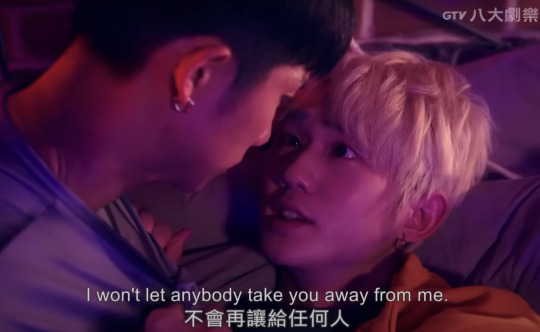
The most heartbreaking line of this scene. 再 - again. Ai Di actually says "Never again will I step aside for anyone." Implicitly, he was previously going to give up on Chen Yi for CDY.
ok this was a longass post but I wanted to keep most of the angst here
#kiseki dear to me#chinese translations#making t/ns verbose again#also about the returning from jail bit#the noodles Ai Di is eating are also part of the custom#those are pig trotter noodles#along with the saying don't look back don't say goodbye#because goodbye in chinese actually translates directly to see you again
432 notes
·
View notes
Text
my observations and take on some nuances not conveyed in translation
to cope while waiting for Tuesday, I've been rewatching Ai Di scenes and noticed some things! this is my drawn out summary
*Disclaimer: I'm not critiquing existing translations, I think the translators have done a phenomenal job! Just wanted to add my 2 cents worth.
Part 2
Language Use in Kiseki
Ep 2
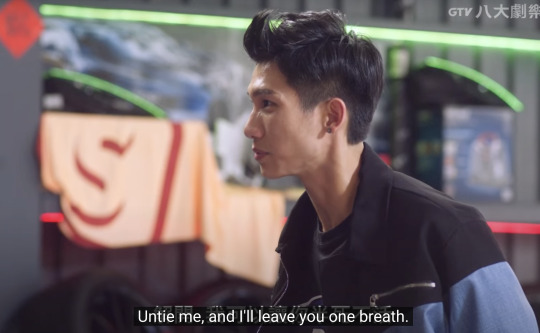
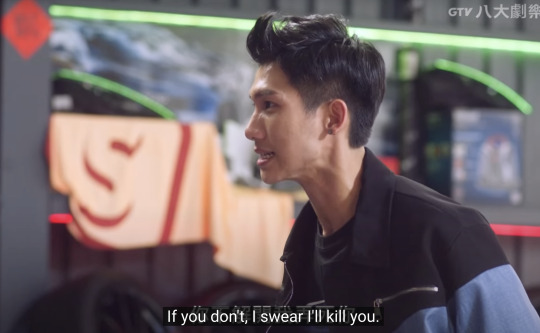
Here I realised, Chen Yi was the one who first said these lines to Ai Di, before Ai Di repeated them to Chen Yi in Ep 12. And the wording is exactly the same...sighs...these two
Ep 3
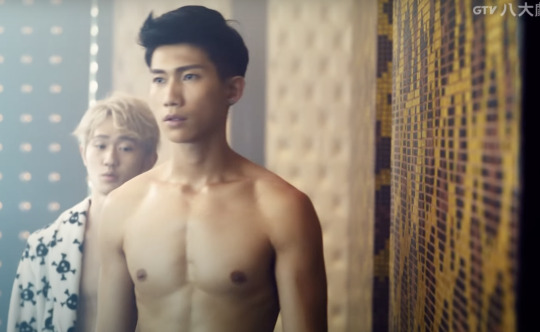
I died. After Chen YI delivered his line "我不找你,你就不会跟喔" - "Like as if you wouldn't have tagged along if I didn't find you", Ai Di actually mouthed "我就不会跟" - "I wouldn't have come". Given his facial expressions mocking Chen Yi's brooding face, I think he was being snarky and just parroting Chen Yi 😭
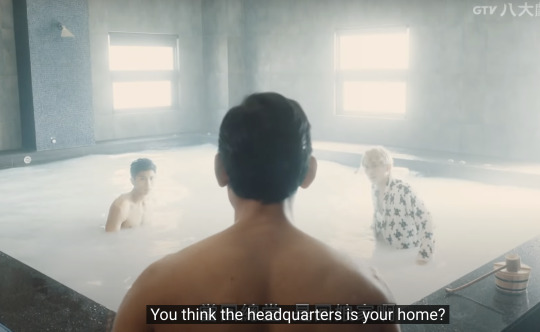
Chen Dong Yang asked them "当回总堂是回娘家" - basically asking them if they take HQ to be their maiden home. 回娘家 doesn't really have any deep meaning (except returning to your maiden home), but chinese/taiwanese dramas usually have female characters use this term when they are being bullied by their husband's family...make of it what you will...
Furthermore, before this he asked them to "叫老爸" (call me dad) when they called him 老大 (boss) and he kept making excuses for them in front of Zhou Ming Lei.
CDY really sees himself as their papa...

Ai Di calls Chen Yi "竖子". Coward fits the context but more directly, it is a derogatory way of calling someone a brat. Chen Yi gets upset because a punk younger than himself is being rude, and I think he got Ai Di's hidden barb - a reminder that Chen Yi is but a kid, especially in CDY's eyes, and how CDY will never see him as a man.
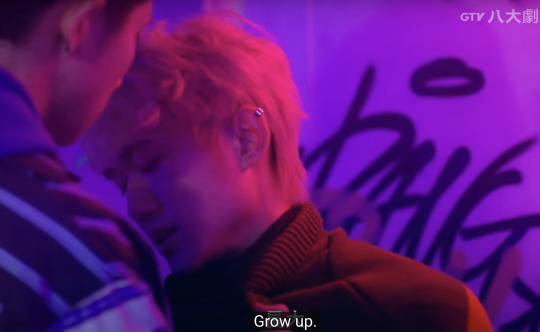
Ai Di makes a double entendre. He says "他会变老,你会长大。长大。" - "He'll grow old, you'll grow up. Grow big." 长大 in mandarin usually means growing up but can also mean /ahem/ growing big. To let Chen Yi know he's thinking dirty, Ai Di purposely looks down in the vicinity of Chen Yi's crotch and smirks.

Ai Di continues provoking Chen Yi, calling him 大哥哥 mockingly. Big bro is a correct translation but doesn't convey Ai Di's feelings. Here he's ironically calling Chen Yi the mandarin equivalent of onii-chan.
Our boy is a big ball of hurt and only knows how to express it through antagonising Chen Yi 🥲
Ep 4
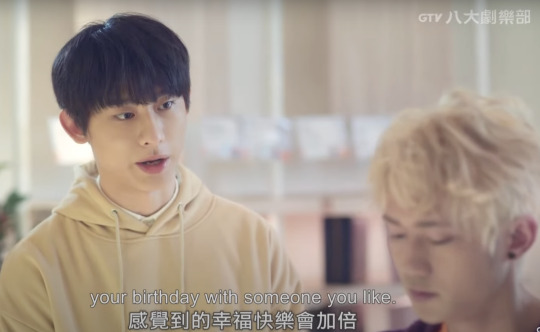
Sighs. I really believe Zong Yi has a profound impact on Ai Di. Zong Yi is the one who told Ai Di that birthdays should be shared with people you like, and Ai Di took it to heart! He repeated this to Chen Yi in Ep 12.
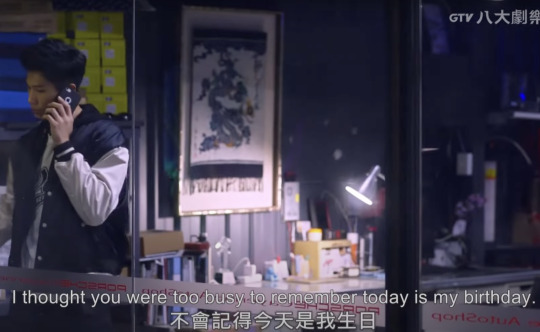
Chen Yi I love you but I wanna smack you. Here he is speaking to CDY and in reference to their birthday, he uses "我的" (my), before adding on "还有艾迪" (and also Ai Di's), instead of using “我们的" (ours). Boy here really wants to be special in papa's eyes...
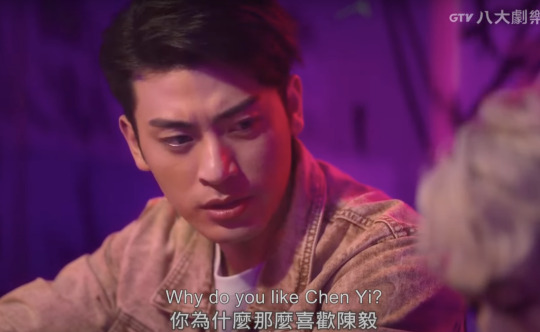
The translation is correct but the emphasis is lost. 那么 - so much. Ze Rui is asking Ai Di why he likes Chen Yi so much. Ai Di's dejection must have been so palpable Ze Rui felt he had to ask Ai Di just why Chen Yi was so good that Ai Di has to subject himself to so much pain.
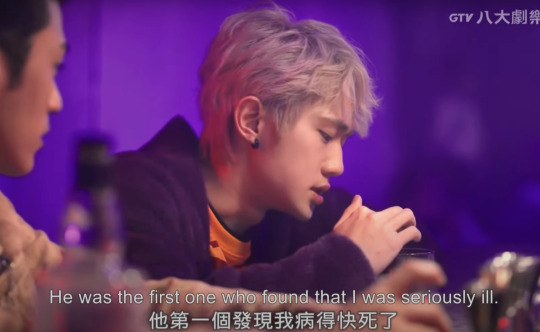
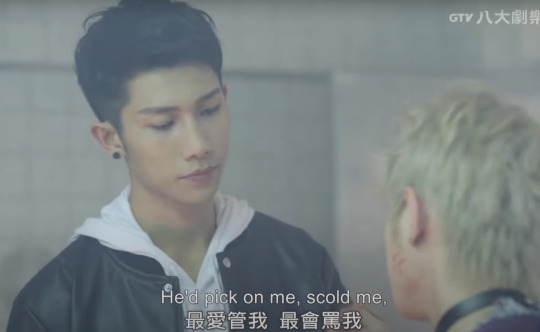
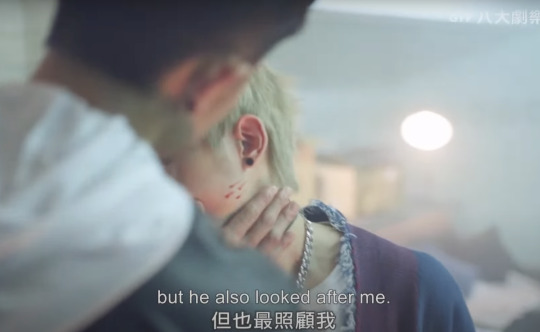
Time for some Chen Yi redemption. Ai Di explains why. Again, translations are okay but nuances are lost. Chen Yi is the one who found Ai Di when he was so ill he was on the brink of death. Chen Yi is the one who cares for him the most (alt. gets in his business the most), the one who scolds him the most. And Chen Yi is also the one who looks after him the most.
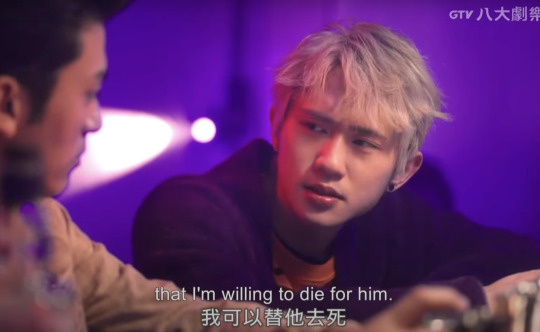
替他 - substitute for him. Chen Yi really is Ai Di's everything so much so that he is willing to die on behalf of Chen Yi. There is a fine nuance between dying for (为他去死) vs dying on behalf (替他去死). I can't put it into words well but to me, I would say the former means there is an intentionality in following your fate, while the latter means there is an active choice in exchanging your fate for someone else's.
this post is getting too long, continued in Part 2
#kiseki: dear to me#chinese translations#i support sharing subtitle corrections and nuances!#together we can inundate the fandom with the most verbose t/ns ever#go OP!!
261 notes
·
View notes
Text
First of all - Sailor Moon was my first anime and I still have the Sailor Moon cards 🤣🤣 Thank you for the tag and the question!! As usual, I have taken something that could be answered in 30secs and turned it into 30mins! I hope you don't mind the length 😅
I'm just wondering if Segasaki choosing to to call him Yoh-kun essentially immediately is something that would be considered normal. I imagine age dynamics/seniority are probably a factor as well
Yes, this would be considered normal, and you are right that seniority plays a part! (the short answer ends here 🤣)
The suffix -kun is usually used for males, although it can, in certain situations, also be used for females. It is considered a polite form of address, though is comparatively a little less polite than -san. Hence, in modern day Japanese, it's usually used to refer to someone who is either of equal rank to you, or lower.
Wrt it being used to signify a close relationship - it really depends on the context. Going from -san to -kun definitely signifies a change in relationship to one that is closer, or more intimate. The use of -kun alone without any prior comparison though, does not tell us anything about the horizontal distance between the two speakers - ie, how close they are - particularly when they are both males, since in University it is very common to use -kun amongst males to address their peers or their juniors (we could sort of take a gander at the possible vertical distance between them though, using other contextual clues).
So, as the senior, Segasaki is well within his right and the social norm to address Yoh as -kun. Of course, if Yoh had actually remembered to give his full name, Tanada Yoh, and Segasaki chose Yoh-kun instead of Tanada-kun, then we could make the argument that Segasaki was at least interested in coming across as friendlier/closer by choosing to use Yoh's first name over his last name. (Going straight to Yoh, without any suffix, would just be plain rude, unless they were in the same university activity club or something similar).
But, if Yoh had jumped straight to Mizuki-kun, then that would be unusual and slightly presumptive, because that would technically imply that he might not be respecting Segasaki's position as his senior, and could come across as rude (again, context plays a big part). Tbf, as the junior in the relationship it's already presumptive to jump straight to Mizuki-san, so the fact that Segasaki simply laughs this off without correcting Yoh signals to us that he's probably a pretty nice guy. (In case you were wondering, both Mizuki and Yoh are very obviously first names, so Yoh can't exactly claim ignorance here.)
This is a slight tangent but - it is common practice to use -kun as a term of reference when addressing fellow politicians at the National Diet (link in Jp), regardless of gender, in order to ensure that social hierarchy does not interfere with the political discussions.
Anyway @halliescomut hope this answers your question and feel free to ask anything else you want to know! Or tag me in your meta again, like that incredibly detailed analysis of Yoh's drawings!

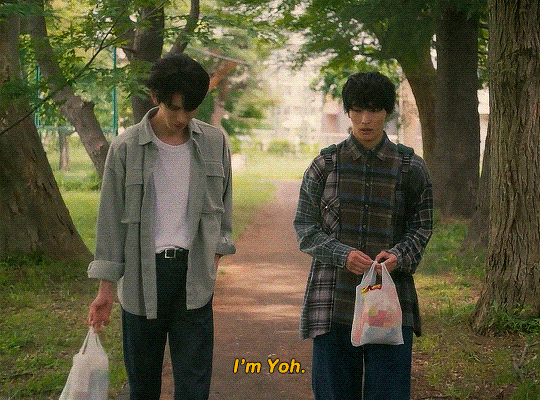


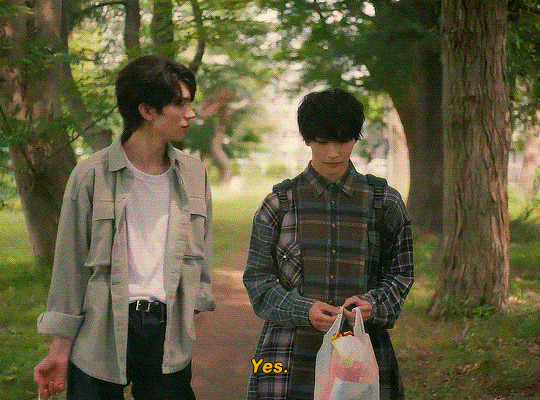
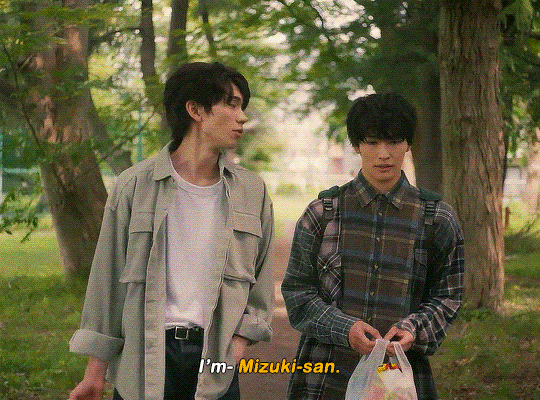

"Ah ... I heard someone call you that."
MY PERSONAL WEATHERMAN (2023).
Episode 6.
#my personal weatherman#taikan yohou#segasaki x yoh#sociolinguistics#my answers#yes i'm still alive sorry ep 7 is just taking some time!
283 notes
·
View notes
Note
I made a tumblr account bc of your amazing posts about MPW! Never used the platform b4 but I love it, just wondering if you will continue to post about the last 2 episodes? You opened up a new world for someone like me who does not speak the language or have insight into the culture! U are really awesome! thank you for the hard work with the posts!
Hi Anon welcome to tumblr and thank you!! Glad you've enjoyed them!! 😁😁
Yes I will finish the last 2 episodes for sure, as well as at least 2 more analysis posts (part 3 and 4, as listed on the masterlist). I'm still very well stuck on MPW and am not going anywhere just yet 😆😆
Thank you for the encouragement!
(PS usually we change our DP because leaving it as the default...shape means you might sometimes get confused for a bot!)
#my personal weatherman#my answers#how long i take depends entirely on how lost i get in segasaki's voice#ep 7 is rather mm 'trying' that way#ep 8 too
12 notes
·
View notes
Text
MPW Language Analysis Part 2
Segasaki x Yoh: Shifts in Emotion and Acknowledging Roles
Masterlist || Language Analysis Part 1 || The Importance of Amae ||
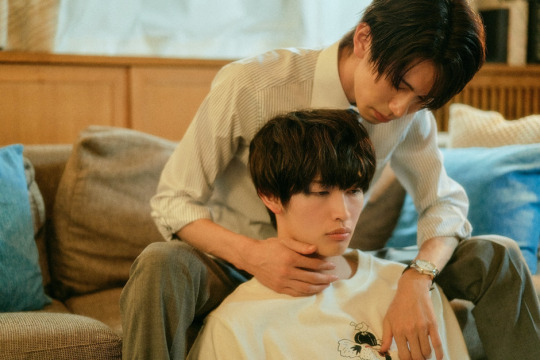
In Japanese, one cannot utter a sentence without communicating at least two things:
(1) the actual content of the message itself, the referential meaning; and
(2) a metamessage about the relationship between the speaker and the listener, an indexical meaning.
A striking feature about Japanese is that it is the latter message that most often assumes greater importance.
From: Creating an Ideal Self: Theories of Selfhood and Pedagogy at a Japanese Ethics Retreat by Dorinne K. Kondo
Every sentence that Segasaki and Yoh say to each other carries 2 meanings - the one we read in the subtitles, and too often, the one that never travels across the screen. The "miscommunication" that many perceive to be happening isn't always just about "using actions vs words" (though there is much to be said about that too) - the words are being used, but it's hard to hear them when said words are in Japanese and packed with information English is simply not designed to carry.
So, with 6 episodes of corrections made and nuances explained, it's finally time to get back to actually talking about how all of this adds to our understanding of the characters and of their relationship. In these 6 episodes, both Segasaki and Yoh have run the entire gamut of speech levels - but where Segasaki shifts consistently and with purpose, Yoh tends to shift as a reflexive, or reactionary response.
Or, what Segasaki choosing to shift up a speech level means to Yoh, and what Yoh's inconsistent shifts tells Segasaki (and us), about his emotional state. I'm kinda sorta not really sorry about this but ah, it's maybe possibly probably even longer than usual??
Quick Recap of Part 1:
We established two key aspects of their relationship:
1) They both acknowledge the power differential between them
- Segasaki, by using "rougher" speech patterns, and Yoh, by tending to stick to the more polite end of the scale.
2) They both consider themselves to be from the same "in-group"
- Both of them default to informal speech patterns when speaking to each other (even Yoh, despite being the junior/lower on the social hierarchy)
And now on to Part 2!
Changes in Emotion: Yoh
Yoh tends to experience his emotions rather intensely, and through his monologues we understand that he isn't always able to process these emotions immediately. As such, the shifts in his speech levels tend to happen subconsciously - there isn't an immediately obvious, predictable pattern to those shifts, because they are simply a reflection of how he's feeling in the moment.

Y: あ、いや。なんでもない…です*
Y: Ah, iya, nandemonai…desu*
Y: Ah, no, it's….nothing*
The shift to polite form, and the awkward manner in which he does it, reflects Yoh's growing insecurity (See EP 2 for other examples).
From the moment Segasaki starts returning home late, Yoh becomes more and more unsure of where he stands with Segasaki, and this growing emotional distance is conveyed through his speech patterns becoming (awkardly) more polite than in Ep 1. He speaks hesitantly and indirectly, until he gets drunk (and even then, his insecurity still shows in how he barely switches down to rough speech during their not-argument).
In Ep 3, we again see Yoh shifting up to polite forms often, except this time, the shifts show his gratitude as well as sincerity.

Because of how ridiculously expensive the pork bun is, Yoh expresses his thanks by saying the full ありがとうございます (arigatou gozaimasu) here as opposed to just "arigatou" or other more casual forms. In return, Segasaki acknowledges the formality Yoh pays him with a nod (and a mouthful of pork bun).
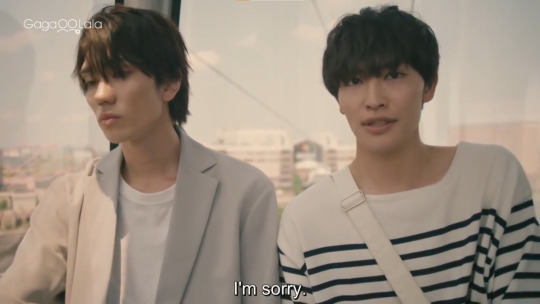
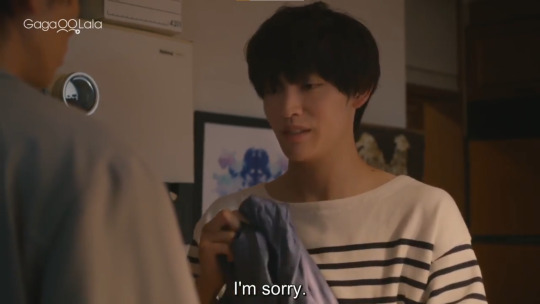
Y: すいません
Y: suimasen
Y: I'm sorry
This is the more formal version of "I'm sorry" (textbook pronunciation is sumimasen, but textbooks are for nerds Yoh's version is very common as well and still polite)
In both these scenes, Yoh switches to suimasen as opposed to his usual, and more casual, ごめん / ごめんなさい (gomen/gomen nasai), that he also uses in this episode. As previously mentioned, "sorry" in Japanese can also be used to mean "thank you". Here Yoh is doing both - apologizing for Segasaki having to "go the extra mile" to take care of him (ie, he feels he has imposed upon Segasaki - a fear he has mentioned a few times), and at the same time also expressing his gratitude for being taken care of. However, it's the shift up to the polite version that conveys his sincerity, and carries the extra message that - despite his regret at imposing on Segasaki - Yoh still values these moments and feels touched by them.
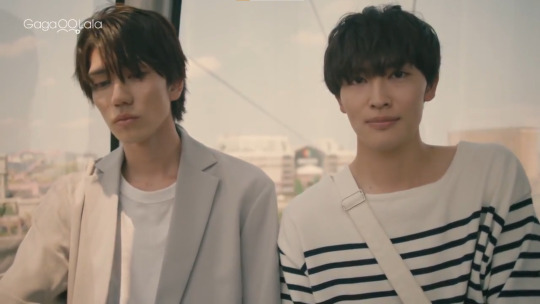
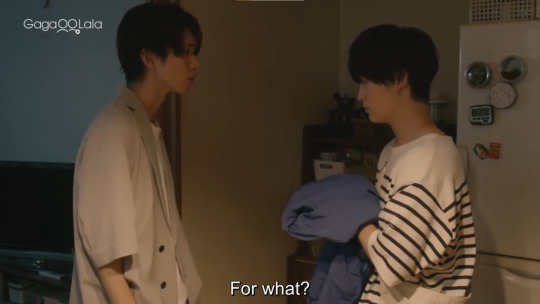
Both times, you see Segasaki taking note of this, albeit slightly confused, and probably a little shy too (Segasaki is after all, very good at picking up on social cues - especially Yoh's - and spends the whole of Ep 3 doing just that).

Y: 漫画が とてもだめです
Y: manga ga totemo dame desu
Y: (My) manga is... really bad.
Yoh spends most of Ep 5 safely ensconced in the informal speech level, switching up only twice - the above scene, and later when he attributes his recovery to Segasaki's care as a way of thanks. The switch in the bathroom is sudden, and adds a sense of certainty to his statement that reflects the intensity of the despair he feels (even though he comes across as more kicked puppy than anything). The formality is also a way to "distance" himself from the reality of it, because it does hurt to acknowledge this.
All of these instances show us that Yoh's shifts up in speech levels tend to reflect when he's feeling vulnerable in some way - when he's insecure, dejected or hurt, or when he feels that he has imposed upon Segasaki.
So then, does Yoh also shift down?

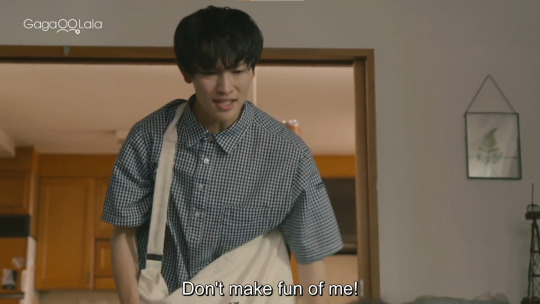
Well, yes and no.
Left (Ep 4):
Y: ふざけんな [very rude]
Y: Fuzakenna
Y: The hell are you doing!
Right (Ep 5):
Y: バカにすんなよ![slurred vowels]
Y: baka ni sun na yo
Y: Don't look down on me!
Even if we include (just barely) the non-argument of Ep 2, there honestly aren't many scenarios in which Yoh shifts down to a "rougher" speech pattern - and he never drops as low as Segasaki does. This has to do with both his acknowledgement of the power differential that exists between Segasaki and him, as well as his less assertive nature. In fact, even when speaking to Man-san, with whom he shares his thoughts more freely, Yoh remains casual, but not rough. (Man-san is waaaay rougher than Yoh, tbh). Hence, when Yoh does shift down, it tends to be explosive and short lived, just like his frustration or anger.
So why "yes and no"? Because being lower in the social hierarchy also introduces another, more interesting way to express yourself - by choosing not to switch up.
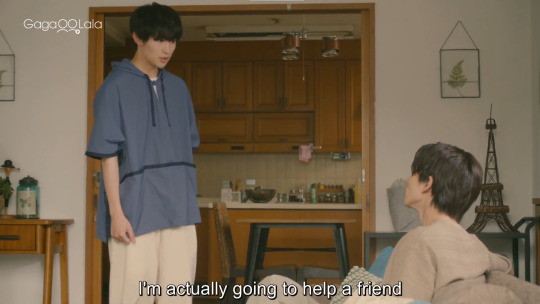

We see this in Ep 5, when Yoh tries to lie about going to Man-san's place. He sticks to his baseline informal speech when he announces this, whereas he previously used polite speech in Ep 4. Is it possible that Yoh was simply overcompensating and trying too hard to sound casual to hide his lie in Ep 5? Yes. But before coming to that conclusion, there is another important detail to note - that instances like this, where Yoh doesn't switch up, have gradually been increasing as the show progresses.
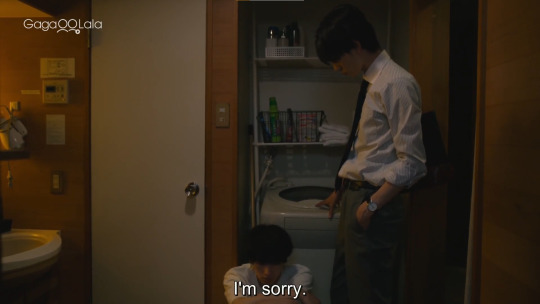

In Ep 5 and 6, Yoh uses the slightly less formal gomen nasai to apologize (contrast this with Ep 2's suimasen mentioned earlier). Given that Yoh himself mentions in Ep 5 that he thought Segasaki would be angry, and in Ep 6 clearly underscores his apology with a proper bow (yes, there are standards to how you should bow in Japan) - you would think that these 2 situations would be the perfect time to switch back up again. So why? Once again, the key to unlocking the metamessage is the wider context; i.e., we need to consider what Segasaki has been doing. please indulge my desire to sound cool and mysterious despite already announcing it in the title
Establishing Roles: Segasaki
In direct contrast to Yoh, Segasaki is very consistent with his speech shifts, and a clear pattern emerges. First off - when Segasaki is angry with Yoh, he drops straight down.
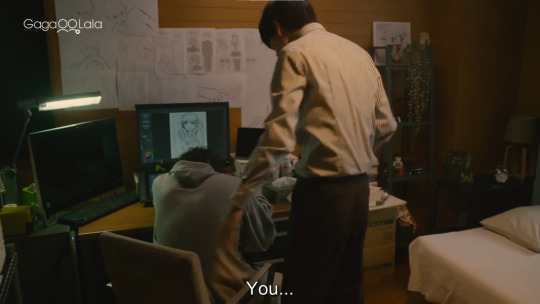
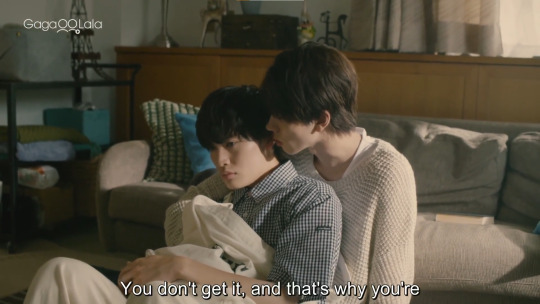
Left (Ep 2):
S: てめぇ [very, very rude]
S: temee
S: You
Right (Ep 5):
S: 分かってねぇだろ 分かってねぇから 泊りで仕事とか言い出すんだろうが [slurred Rs, word contraction, slurred vowels]
S: wakattenee daro wakattenee kara tomari de shigoto toka ii dasun darou ga
S: You don't do you? You don't understand and that's why you can just say things like you'll stay out to work overnight.
Like, waaaaaaaay down. The argument in Ep 5 is the most obvious example of this, but using "temee" to address someone like he does in Ep 2 is very very rude and, together with the "haaah?!" Segasaki says before this line, also does a lot to convey that he is Not Happy.
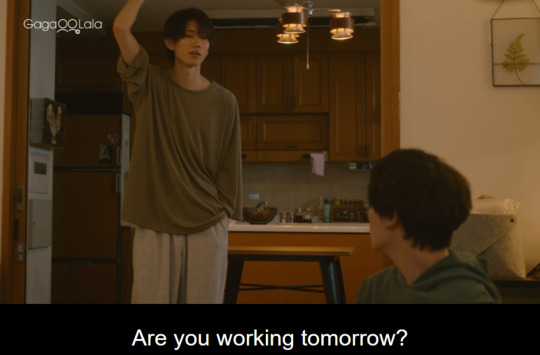
S: 明日は仕事すんのか [word contraction]
S: ashita wa shigoto sun no ka
S: すんのかしないのか、どっちだよ [word contraction, informal, assertive end particle]
S: sun no ka shinai no ka, docchi da yo
S: Are you working tomorrow?
S: Working or not, which is it?
The lines in this interaction from Ep 3 aren't really rude per se - certainly not compared to temee - but they are rougher than his usual and very direct. We've seen Segasaki do this multiple times throughout the episodes - dropping his levels when he's being assertive, and it is in response to that assertiveness, that Yoh gives the following reply:

Y: いや、ないです [plain forms, but with the addition of desu form]
Y: Iya, nai desu
Y: No, I don't [have anything planned]
Mixing plain forms with -desu at the end makes Yoh's reply a little more formal, and is another way in which Yoh acknowledges the power differential between them. Being higher in the social hierarchy means Segasaki enjoys a greater sense of linguistic freedom, and shifts down in speech level are therefore unsurprising, and indeed, expected.
So, if there is no real need for Segasaki to shift up, then, what does it mean when he chooses to do so?
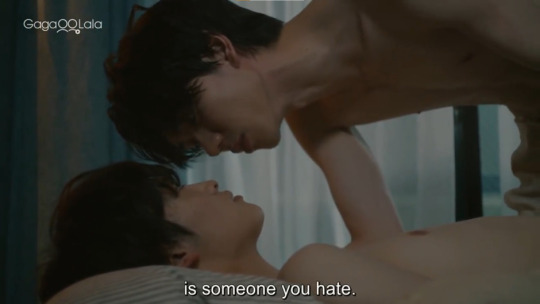

Left:
S: まあ 残念ながら 相手は大嫌いな俺ですけど
S: Maa... zennen nagara aite wa daikirai na ore desukedo
S: Well, unfortunately, your partner is me - who you hate so much
Right:
S: 好きにさせてもらうけど...な ?
S: suki ni sasete morau kedo... na?
S: I'll gratefully do as I please...yea?
After an entire episode of using Yoh's own words to tease him as a way to try and get Yoh to face his own feelings, Segasaki lands his sharpest and strongest push of the day in these 2 scenes not by reinforcing the hierarchy between them, but by subverting it. Shifting up to a more formal speech level when he doesn't have to, particularly in the second scene where he uses deferential word forms, creates the illusion of elevating Yoh in the hierarchy, which is then immediately undermined by the irreverent tone in which Segasaki says them.
In other words, Segasaki only shifts up as a power play.
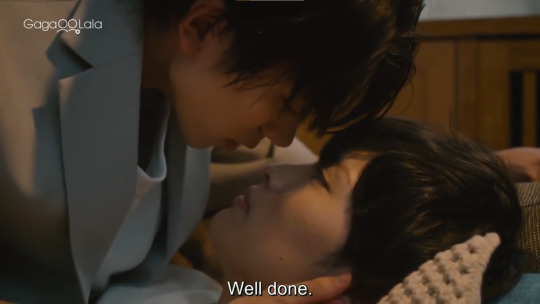

S: よくできました
S: yoku dekimashita
We first see Segasaki use this formal way of saying "well done" at the end of Ep 3 and again in Ep 4, and it brings to mind the literal stamp of approval that teachers often give to students in school. Here, there is no teasing or subversion of the hierarchy going on. Segasaki is establishing his role in Yoh's life - to provide and care for him - through the use of polite speech, and reinforcing the power differential between them in the most straightforward way possible.
This use of polite speech allows the speaker to indirectly index their social identity - often as one who is in charge or responsible. Within the Japanese household, it also happens when a role/obligation (often parental) is being carried out - eg , a parent might switch to polite speech to indicate their role as provider when asking the rest of the family "What would you like to eat?". Similarly, we again see Segasaki underscore his role in the following:

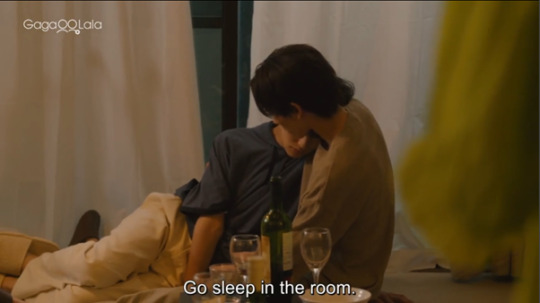
Left (Ep 5)
S: ごちそうさまでした
S: Gochisousama deshita
S: Thank you for the food
Right (Ep 4)
S: 寝るなら部屋いきな*
S: neru nara heya ikina
S: If you're going to sleep, then go to the room alright?
In Ep 5, Segasaki leads the saying of this standard phrase, customarily said at the end of a meal to express gratitude to everything that made the meal possible. It is the use of the full, more formal version (as opposed to just gochisousama) that indexes his role as Yoh's caregiver when he leads in saying this, and indeed he spends most of Ep 5 enjoying that role. In Ep 4, although he does not quite use the -masu form here, the imperative form "ikina" brings to mind a parent trying to coax their child to bed, the same way Segasaki is doing to a very drunk and sleepy Yoh.
This is the key we were looking for - with every episode, Segasaki consistently reinforces his role in Yoh's life, the same way he consistently responds to and encourages Yoh's amae. And with every episode, Yoh becomes a little more confident of his place with Segasaki, a little more willing to believe that maybe Segasaki might really return his feelings. It's easy to look at Yoh in Ep 2, see him push Segasaki away, and think that the same Yoh appears in Ep 5, but that couldn't be further from the truth. Because in Ep 2, a drunk Yoh barely drops to rough speech, whereas in Ep 5, a sober Yoh feels safe enough to even "curse" a little (well, as far as cursing goes in Japan at least, which admittedly is not far). In both word and action, they have both grown, and have both contributed to the strengthening of their relationship.
So! In conclusion (omg we made it to the end) we have established that:
Segasaki has a clear, predictable pattern in his shifts - he switches up to formal when establishing or reinforcing his role in Yoh's life, but when he's serious, or angry with Yoh, he drops all the way down.
Yoh is less consistent, because his shifts tend to be more subconscious and reflective of his emotional state. He's more inclined to switch up when he's in a vulnerable state, eg, feeling insecure or dejected, or when he wants to express his sincerity in apologizing or showing gratitude. When he's nervous, or in response to Segasaki either being direct with him or upset with him, he'll sort of switch up too (ie, he'll mix polite forms with informal forms, or he'll try to say things in an indirect way).
Through the use of speech level shifts, both Segasaki and Yoh indirectly reinforce and acknowledge their individual roles in each other's life, and by observing the changes in these shifts over time, we the audience are able to track the progression of their relationship as well.
In the next part, we'll look at the differences in the way they speak to others versus between themselves - looking specifically at examples from Ep 4, 6 and 7.
As always, thank you for reading, and feel free to ask any questions! (*ˊᗜˋ*)/
#my personal weatherman#taikan yohou#体感予報#segasaki x yoh#sociolinguistics#japanese language#MPW language analysis#mytranslations#MPW subtitle corrections#this post assumes you have read part 1 of the language analysis#who says MPW is over#it's not over i don't believe it#also this was so long#was it too confusing? should I be less nerdy?#ep 7's corrections will come out next#tumblr's formatting sucks but reddit sucks more lol#i still enjoy writing these posts though#i hope it gives everyone an excuse to rewatch MPW again
131 notes
·
View notes
Text
Love without a Template
If there is one thing that's been worrying the Ai Di/Chen Yi faction is the number of times Ai Di mentions dying, specifically dying to protect Chen Yi. We've been hurt by foreshadowing before, and while I can't discount him getting shot (please LIVE), there might be another explanation for this theme.
Before I delve in, a quick shoutout to @notfreetoday who provided a rough summary of a livestream from Louis Chiang (Ai Di) and Nat Chen (Chen Yi). Please note I'm doing a bit of interpreting from a quick translation, so please don't read too deeply into any specific word choice.
There were a few interesting themes that the actors brought up around love. LC noted that although Ai Di loves Chen Yi, he doesn't recognize it as love, but rather a feeling of possession, wanting to both possess and protect Chen Yi. Chen Yi is the center of Ai Di's world, the only one who ever cared and protected him. We can see this often in the early episodes where Ai Di will do almost anything, including being an absolute pest, to get Chen Yi's attention. (Another little aside from @notfreetoday, LC ad-libbed virtually the whole scene. His instructions were 'be annoying'. God...I love him.)

Chen Yi, on the other hand, has misconstrued wanting their boss's approval and encouragement as love.
The important issue here is that neither of them have a good template for love. They both come from broken backgrounds and their life in the gang is the closest thing to family and love that they have ever experienced. It doesn't map on any usual template of love. What they do know is the specter of death and wanting to protect the other with their life. To them that is the highest form of devotion.
Also in the interview, the actors note that there is a sort of desperation to their love, especially since they feel like they could die any day.
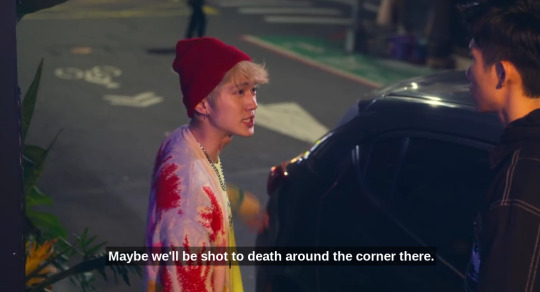
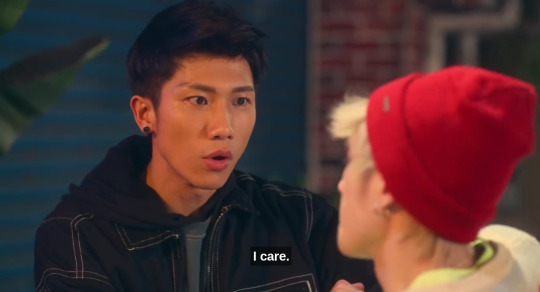

The discussion in their interview puts this exchange in a different context. Ai Di brings up the fact that they could die at any time, who cares, and Chen Yi immediately counters that he cares. However, he tacks on the true killer for Ai Di, it's his responsibility. Ai Di doesn't want a declaration of responsibility. This is why he is so upset and they part angry with each other.
All this talk of death and taking a bullet for each other may not entirely be foreshadowing, but actually represent how they are communicating their feelings about their love in the only language they know. (Please, please, let this not be foreshadowing. I need my feral cat and his stoic love to live.)
#kiseki: dear to me#great points!!#much more willing to take this POV#as long as they don't die i'll be ok#this is a great interview btw#but my brain is still taken with mpw#also thank you for the disclaimer i really appreciate it
119 notes
·
View notes
Text
My Personal Weatherman, Full Circle
A common criticism of My Personal Weatherman that I’ve been seeing is “why don’t they just have a conversation about it already?” I certainly sympathize with the truth behind that statement; it can be frustrating to watch fictional characters refuse to communicate for reasons that feel manufactured.
But that’s not what’s happening in this show. Segasaki and Yoh are constantly trying to communicate, taking steps to and from each other. They have such difficulty getting on the same page, despite the depth of their feelings for each other, because their individual neuroses and baggage place them in totally different books. To quote @notfreetoday again (it just happens to be the best encapsulation of the show!) "it’s not about what is being said (or not), it’s about what is (and isn’t) being heard." It doesn’t matter if Segasaki’s willing to vow eternal love (which he is, the big softie) if Yoh can't hear him because he believes he's fundamentally unworthy of love. Yoh has to hear him first.
And that’s why I love this finale, because I think it so beautifully demonstrates their growth over the course of the series, the ways they still have to go, and their commitment to finding a way forward.
First and foremost: they’re both willing to be more honest with each other. Yoh asking Segasaki to untie him is quite spicy, but also quite heartwarming; the reason Yoh wants to be untied, presumably, is to touch Segasaki back, and he’s willing to advocate for himself in bed to do it. * And when Segasaki teases him too hard with the idea of a new rule, Yoh (who doesn’t seem to understand he's being teased) calmly tells Segasaki no. These would be unfathomable actions to Yoh in Episode 1.
As for Segasaki... I really love Segasaki finally outright asking for Yoh to greet him when he comes home. It’s a moment of vulnerability for Segasaki, but it’s also a moment for Yoh to step up. Yoh specifically states in his internal monologue that he doesn’t get it; why would Segasaki get so happy over this one little thing? In the first few episodes, Yoh registers similar, more subtle requests by Segasaki as orders that he figuratively rolls his eyes at and dismisses because he doesn’t understand them.
But here, Yoh moves past that; just because he doesn’t understand it doesn’t mean it’s not important to Segasaki, and he wants to make Segasaki happy. So he does it, and promises to keep doing it, making Segasaki feel so affirmed and loved and cared for that he immediately pounces on Yoh (lol).
Things aren’t quite perfect, though, because communication is not a one and done proposition. It’s a continuous thing, and they’ve only just begun. Yoh not getting the manga confession is funny, but also demonstrates the degree to which he still struggles with subtext (which the manga confession barely qualifies as†) and overtures that fall short of, well, tying him up. Segasaki teases Yoh too hard with that “new rule” (though he does smooth things over with a “Just kidding”) and still clearly believes that the Shady Editor is at large.
But the important thing is that these things, which would once have derailed them, are no longer such staggering obstacles. They can reach out to each other without fear of rejection, even if the answer is no, because they’re willing to put in the work for a relationship that is so important to them.
The dinners in Episode 1 and Episode 8 are the bookends of the series; the same event (dinner at home), but featuring their relationship in very different places. In Episode 1, dinner is quiet and more dimly lit (the camera looks into the living room) with Yoh in his own head and not quite making eye contact... as well as lying to himself that Segasaki isn’t eying him up like he’s dessert. In Episode 8, we stay on a shot of them at the dining table, looking into the warmly lit kitchen, as they eat and talk and clearly take great pleasure in each other’s company. They’ve been together this entire time, but now they’re together. That’s why we can end the story here; that’s why this is a satisfying ending.
I think these two crazy kids are gonna make it after all.
(Although I would never say no to more My Personal Weatherman...)
* It took me a minute, but I howled at seeing that the sheets had been changed after this scene. Continuity!
† “You fool, he can’t handle a framing device!”
#my personal weatherman#taikan yohou#segasaki x yoh#you've said everything so perfectly#they really came full circle#so much growth and so much potential for the future#i love them so much#i'm gonna miss them#also i totally had to go back and find the sheet change 🤣🤣🤣#thank you for sharing all your thoughts on this show#i have enjoyed them immensely
116 notes
·
View notes
Text
MPW Ep 6 Subtitle Corrections
Masterlist: EP 1 || EP 2 || EP 3 || EP 4 || EP 5 ||
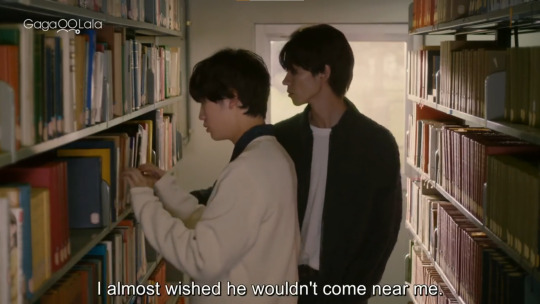
Y: 正直言って 怖い
近づく度に 心臓が跳ねるから
何なら近寄らないで欲しい
住む世界が違うから
好かれたいとかは思わない
ただ。。。
嫌われてしまったら死んでしまうかもしれない
想像するだけで 胃液がせり上がった
Y: To be honest, I was scared.
Because whenever he came close to me, my heart leapt and skipped a beat.
I wished that, if possible, he wouldn't come near me
because we lived in different worlds.
'I want him to like me' - I never had a thought like that.
It was just...
If he ended up hating me then I felt like I might die.
Just thinking about it made my stomach turn.
We've seen for awhile that Yoh's fear that Segasaki will one day come to disdain him is what keeps him from voicing his thoughts out loud - but it is in Ep 6 that we truly learn the intensity with which Yoh feels, and come to understand why that fear overwhelms him to the point that he is incapable of hearing Segasaki's love for him.
Or, Yoh sees Segasaki for the first time and literally starts spouting poetry in the way only a visual artist can. Get ready for a lot of interaction breakdowns - this episode tells us quite a lot about these two! Same translation disclaimer applies, Ep 6, let's go!
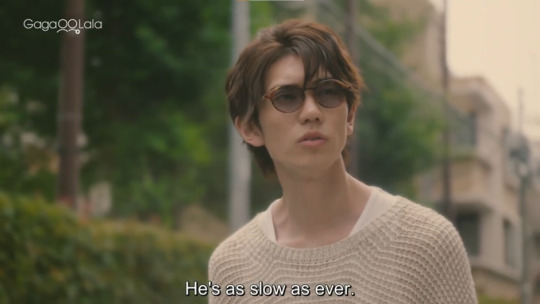
S: 相変わらず 歩くの遅ぇな
S: As usual, he walks so slowly
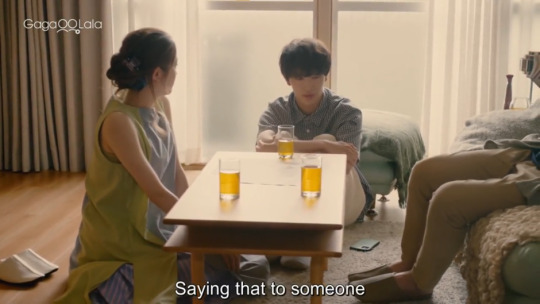
Y: あのさ 実は
Y: 出てくるときにケンカしちゃって
M: え?どうしたの
Y: お前の仕事なんてどうでもいいって言われた
M: 瀬ケ崎さんが?そんなこと言ったの?
Y: どうでもいいって なんだよ
Y: 人が一所懸命やってることに対して*
Y: 最低だよ あいつ*
Y: You know... actually
Y: When I was leaving we got into an argument
M: Huh? What happened?
Y: I was told "I don't care at all about something like your work"
M: By Segasaki-san? He said something like that?
Y: "I don't care at all"... what's with that!
Y: To say that about something that someone is giving their all for...*
Y: He's the worst, that guy**
**Yoh uses あ���つ (aitsu) to refer to Segasaki as "that guy". This is again considered rude, though is often used amongst male friends as well (like calling someone an asshole/bastard). He tends to use this word to refer to Segasaki in his head, especially when he's annoyed with him.
*Just like at the end of Ep 5, where Yoh emphasizes that he will become someone who can earn more as opposed to just earning more, here Yoh specifies that he is upset with Segasaki's response to his work, rather than being upset with the response being directed at himself, as the original subs imply. It's a small difference but I think it's important because it fits with his entire character. He has consistently only been triggered by comments about his work, not about him as a person. Yoh is self-conscious and sensitive about his work, because he sees competence as a measure of worth. It's precisely because he ties his self-worth to his work that he falls into such a deep depression in Ep 5, and it is the same reason why Yoh does not understand what good Segasaki could possibly see in him - after all, there is no merit in just being who he is, only in the work that he can do.
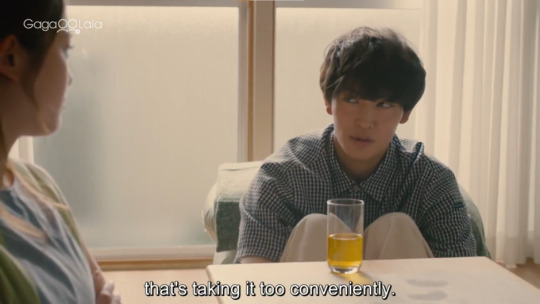
Y: いや それは都合よく受け取り過ぎだよ
Atsuya: ダヨ君 言葉って受け取り方が9割だからさ
A: 同じ言葉でも その時の気持ちやコンディションによって
A: 違った意味に捻じ曲げちゃうものなんだよ
A: ダヨ君が元気な時だったら もっと甘~く聞こえたんじゃない?
Y: No, that's just over-interpreting it in my favor
Atsuya (Man-san's husband): Dayo-kun, they say that about 90% of the meaning words convey comes down to the way we interpret them, so
A: Depending on the way we feel, or our condition in that moment, that meaning can end up distorted and warped, even if the same words are used, you know?
A: If Dayo-kun you, had been in a happier mood, might it not have sounded a lot sweeter to you?
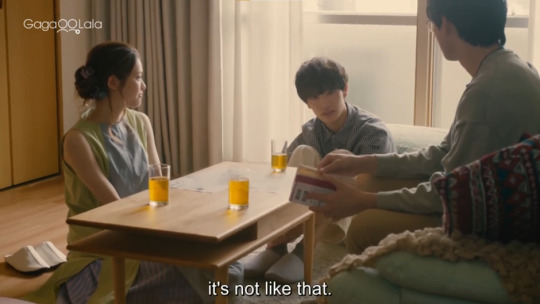
Y: ん。。。いや、違うんです
Y: 俺とあの人って そういう感じじゃないんで
Y: Mm... No, it's not like that
Y: That person and I, well... that's not what it's like (between us), you see
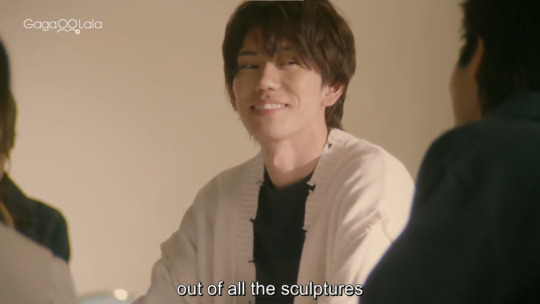
Y: あの人を初めて見たとき
この星の生き物じゃないかもしれないって思った
少なくとも地球上で見たものの造形の中で
一番きれいだとおもった
耳の形 鼻筋
下顎角のライン 唇の膨らみ
きっと見えない眼球の形状まで
きれいなんだろうなって
Y: When I first saw that person
I thought that he might not be a living thing from this planet
At the very least, out of all the forms that I had ever seen on this Earth
I thought he had the most beautiful one.
The shape of his ears, the ridge of his nose,
The line of the angle of his jaw, the full contour of his lips
Even the structure of what could not be seen - the globe of his eyes -
I thought for sure that too must be beautiful.

Y: 趣味で漫画は描いてたけど
現実の人間を描くのは初めてだった
それに
男を描きたいと思ったのも初めてだった
今 目に焼き付けて 描きつけておきたい衝動に駆られた
たぶん あの美貌と同じ空間にいた
そのせいで 俺は おかしくなっていた
Y: I had drawn manga as a hobby but
It was my first time drawing a real live person.
And,
It was also the first time that I thought "I want to draw a man"
In that moment, driven by impulse, I wanted to burn his image into my eyes, to capture his likeness down on paper.
Probably, it was because I was in the same space as that beauty.
It was because of that, that I began to go crazy.
At 06:44, when Segasaki's green shirt classmate comes in calling his name, you can see that Yoh mouth’s "Mizuki" after he hears it.
(Btw Green Shirt later wears a Red Jacket, and is played by Nishimoto Maiki, the leader of the group Acchan is in - GENIC. Cute shot of the 3 of them here)

S: 直接何かしてくるわけではないし 別にいいと思うけど
S: Well it's not like he's doing anything to us directly... I think it's fine actually
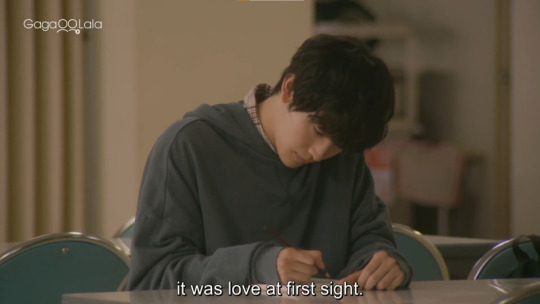
Y: 女の子が相手なら
一目惚れだとはっきり思ったかもしれない
でも ただただきれいな男だったんで
自分の脳が そこまで処理しきれなかった
Y: If it was a girl
Then maybe I would have clearly understood that this was love at first sight
But it was just very simply, a beautiful man so
My brain couldn't handle processing more than that
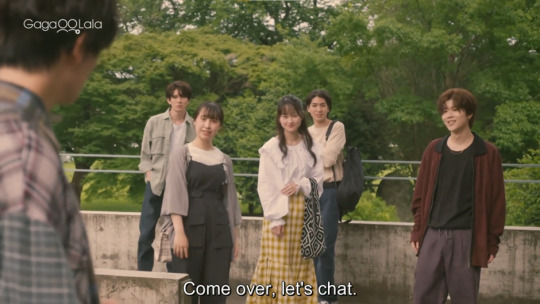
Most of this is not subtitled, and it’s a little muffled, but as the group walks over you can hear that Segasaki is the center of their conversation here, though he's not actually participating in it much. It speaks to the group dynamics, so I'm including it here (Segasaki is bolded):
Girl: ええ?
S: ちがうよ
Red Jacket: 瑞貴じゃん、ね、今ね?
Girl どうせモテるじゃん
S: いやモテない
Red:モテるよ瑞貴が
Girl: 告白されてるよ どうせ
Red: されてる されてる
Girl: あれ!ぼっちくん*じゃん
Red: うわっ マジだ ぼっちくんじゃん
Boy: いつも俺たちのことチラチラ見てる
Girl: ちょっと来なよ おしゃべりしたげるからさ**
Girl: Whaat?
S: It wasn't
Red Jacket: It was (said to) Mizuki wasn't it, right? Just now?
Girl: I mean you're popular anyway!
S: No, I'm not
Red: Mizuki's popular
Girl: Whatever it is, that was a confession (you received)
Red: It was, it was
Girl: Oh hey! Why, isn't it Little Loner*?
Red: Oh snap, you're right! It is Little Loner!
Boy: The one who always sneaks looks at us
Girl: Come here a bit, we'll talk to you, ok?**
*ぼっちくん (Bocchi-kun) - Bocchi is slang for loner, and by adding the suffix "-kun" to it, they've turned this into a diminutive, like a nickname. It sounds cute and friendly, but is clearly meant as a casual sort of insult, so I've translated it as "Little" here.
**This is an interesting line to discuss. She tells Yoh to come over, using the phrase 来なよ (kina yo) - this is the same "na" that Segasaki uses in Ep 4 actually, when he tells a drunk Yoh to go sleep in the room. It's the exact same word form, but where it was tender when Segasaki said it, it's highly insulting here - and the reason is because of the context and their (non-existant) relationship. She may be Yoh's senior, but this is the first time they're meeting, and they are nowhere near close enough that this phrasing would ever be seen as appropriate. She then tells him "we'll talk to you", using the colloquial form of "~したあげる (shita ageru)" aka "to do for you" - in other words, she's framing the action of them talking to him as if it were a gift from them to him (this word form also implies they are above him in the hierarchy). She also adds the polite prefix "O" to the word for "talk", which in this context is meant to make her appear sweet and ladylike.
In other words, with just one line, she has insulted Yoh not only by talking down to him as if he were a small child or a pet, but also by insinuating that she's a sweet, lovely person who has been so kind as to deign to speak to him.
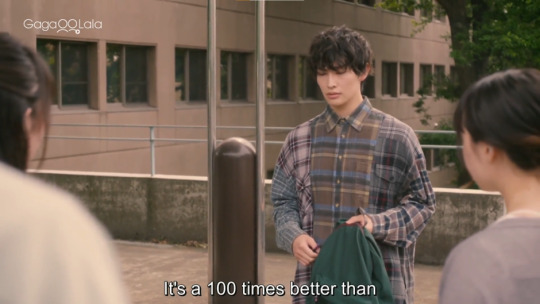
Y: あの。。。俺* 買ってきます
Y: 絡まれてるより100億倍マシだわ
Y: Um... I*... will go and buy it.
Y: That's definitely 100 million times better than getting harassed by them
*Yoh still uses the masculine pronoun 俺 (ore) for "I" here (the same one he's used in every episode) which is remarkable for the fact that he doesn't switch to the more polite form 僕 (boku). Nowadays, it isn't really expected per se that a junior make this switch - especially since "ore" is usually the go-to pronoun for most male university students - but the switch wouldn't be surprising either, given that they are his seniors. Yoh does acknowledge their seniority when he uses the formal -masu form of the word "to buy" - but in the context of them bullying him, the choice to stick with the more masculine pronoun "ore" suggests that he isn't intimidated by them.
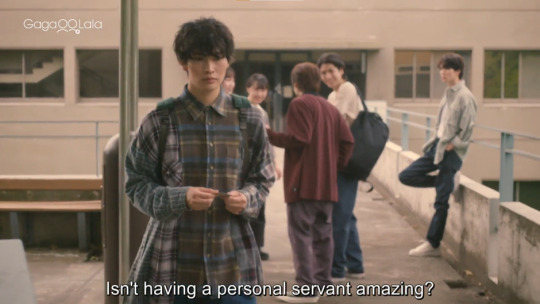
Red: セルフパシリって すごくね?
Girl: やばいよ
Red: He automatically offered to be an errand boy! Isn’t that crazy?
Girl: It’s nuts!
パシリ(pashiri) - to be made to run errands - is slang, and it is used specifically to refer to cases where someone with more social power orders another around. It’s almost always linked to bullying or misuse of social power – so by using this word, these guys - they know exactly what they are doing.
Y: クソだよ あいつら*
Y: Those bastards*… they’re trash
*Yoh uses the same word あいつ (aitsu) to refer to the gang that he did at the beginning of this episode to refer to Segasaki - once again it is the context that changes the meaning of this word. With Segasaki, it is proof that they share a close relationship. With these upper classmen that he's just met - it's definitely rude.
This is a very common form of bullying in school, and evidently, Yoh recognizes it immediately. The fact that he jumps so quickly to cooperating with it tells us sadly that this is something he's familiar with - he's likely been bullied before. This is unfortunately, unsurprising, because Yoh doesn't adhere to social norms very much. He eats alone, he stares at people, he doesn't greet his seniors properly (that slight bow is not enough, there should at least be a verbal greeting of some sort).
In my post on amae, I talked about how the interdependent self-construal means that one's ability to assimilate is seen as a value. In the same vein, people who do not fit in with the group, or who do not conform, are not looked upon favorably in Japan, because it is often assumed that they simply do not want to. It is not that they are unable to assimilate, it is that they are refusing to make an effort to be part of the group, and thus the fault and blame lies with them. Ostracization of those different therefore, is the expected consequence and punishment that the group metes out. All of us have to do our part to adhere to the rules of the group - what makes you so special that you can do your own thing? If you just did your job of fitting in like the rest of us have, well, then you wouldn't be in this position in the first place, now would you? - This sort of justification is the reason why bullying in Japan can become very, very extreme, and why despite efforts, has been so difficult to eradicate.
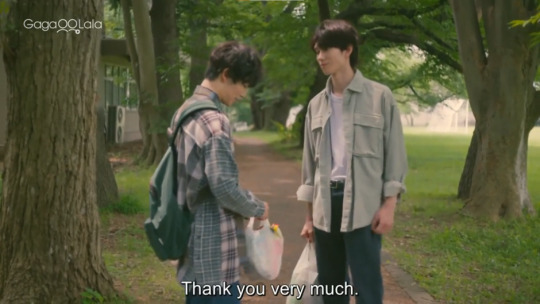
S: そんなに 一人で持てないだろうと思って
S: 貸して
Y: ありがとうございます*
S: 行こう
S: I thought all of that was probably going to be too much for one person to carry
S: Pass it over
Y: Thank you very much*
S: Let's go
*Yoh uses the full, polite version of "thank you" here, and he will, for the most part, continue to use desu/masu forms with Segasaki, and answer him politely, in recognition of their senior/junior relationship. Similarly, Segasaki uses informal forms with Yoh, though he maintains a friendly demeanor and does not drop to rude forms at all, because they aren't that close yet. Note how he says 行こう (ikou) for "let's go" here - different from his present day "we're going", which leaves no room for argument.
(Also, he took the heavier bag of drinks (´ ▽`).。o♡)

S: 結構歩くのゆっくりなんだね
Y: よく 言われます
S: 君 名前は?
Y: あ 葉って言います あの。。。葉っぱの
S: ふーん 葉くんか
Y: はい
S: 俺は
Y: 瑞貴...さん
S: なんで知ってんの?
Y: あ そう呼ばれていたので
S: よく 聞いてんな
Y: はあ まあ。。。
Let's break this down to look at some social cues and nuances:
S: You walk quite leisurely, don't you?
Y: I've... been told that a lot
This is more than just a callback to the beginning of the episode (or a chance to contrast how much more polite and sweet Segasaki sounds here 😂) - This is another way in which we see Yoh does not fit in. Segasaki is his senior, who has gone out of his way to come help him (never mind that Yoh's being bullied), and he should at the very least, be trying to match Segasaki's pace, not making him wait like Yoh does here. Segasaki's comment should be taken as much as an expression of surprise, as it should a cue to catch up - Yoh glances briefly at Segasaki after this line (which seems to amuse the latter) but he doesn't actually apologize outright or walk any faster. He does admit that he's been told this often - which sometimes can work as a concession, because you sort of validate what the other person is saying, but at the same time you aren't quite agreeing either. That said, it can backfire, because it means you've been made aware of your habit and yet have done nothing to change it. Segasaki doesn't seem to mind though, and actually matches Yoh's pace here.
Speaking of "pace" - "マイペース" or "my pace" is a loan word from English, and is a term used to describe someone who tends to do things, well, at their own pace, or in their own way, and who isn't bother by the people or goings-on around them. Usually meant as a benign, sometimes affectionate comment on someone's personality, it often brings to mind the image of someone who appears to drift during conversations, who might be a little "slow" in social interactions, or who physically lags behind the group. It can have negative connotations, because it means the group needs to make concessions for this person (like looking for them when they've wondered off). Yoh is the epitome of someone who is "my pace", and I'm very sure that the emphasis on his slow walking is not just a peculiar quirk of his character, it's an intentional part of the character design to show how Yoh is different.
S: *You... what's your name?
Y: Ah, I'm called Yoh. Um... written with the character for "leaf"
S: Hmm~ Yoh-kun huh..
Y: Yes
*Segasaki uses the polite pronoun 君 (kimi) to refer to Yoh here, as opposed to the rougher お前 (omae) that he now uses in the present day.
That little action Yoh does whilst saying "leaf" is him drawing out the kanji character for his name. It's quite common to tell someone which character is used to write your name, because the characters usually mean something, and it helps others to remember. Strictly speaking, Yoh really should be introducing his full name here, but judging by how he's been fiddling with the plastic bag, he's probably just too nervous to realize.
S: I'm
Y: Mizuki...san
S: Why do you know that?
Y: Ah... that's what.. you were called (by them) so...
S: You listen closely don't you
Y: Ahh.. yea...
Nice save 😂First of all, it's extremely unusual to jump straight to using someone's first name instead of their family name (unless you're still a kid), let alone doing it to an upper classman, though Yoh does manage to tack on the polite suffix "-san" at the back. It's the verbal equivalent of stepping right into someone's personal space and touching their bag or something and then being all "er there was something there...". It's just weird and borderline inappropriate 😂 The fact that Segasaki doesn't scold him for taking such a liberty, or show any sign that he appears weirded out by it (in fact, he actually goes along with it!) tells us that Segasaki is a very kind (yasashii would be the right term here, the same term that appears at the end of this episode) or at least a very tolerant individual though I'd also like to think he just finds Yoh's strange ways a little cute too.
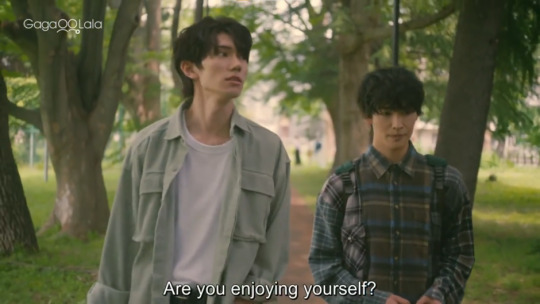
S: いま 楽しい?
Y: え?あ いえ
S: 絡まれて パシらされてさ
Y: ああ。。
S: どう?
Y: いや たのしくないです
Y: 瑞貴さんは?
S: 俺?
Y: はい
S: 全然楽しくない
S: 内緒ね
Y: はい
Continuing with the breakdown:
S: Is it fun?
Y: Huh? Ah no-
Segasaki's tone changes here to a more serious one - all he does is stress the final syllables of the word "fun" to indicate he's asking a question, instead of adding any end particles that might give more context, or that might soften the tone. The topic switch is a little sudden, which is why Yoh seems a bit confused. It doesn't help that the words are a little ambiguous - it literally translates to "now, fun?" - except the Japanese word for "now" is often used to mean "just now" as well, because the Japanese concept of time is not quite as linear as it is in West. "Now" doesn't just refer to "this current exact second we are in", it extends from whenever the "current activity" began right up to "this current exact second" - the key is figuring out what the current activity is 😅. Because Segasaki jumps into this topic so suddenly, and without much contextual cues, Yoh can't quite tell whether he means now, as in them walking together, or now, as in, the whole being sent on an errand thing, which is why Segasaki clarifies in the next sentence:
S: Being hassled, and sent on errands?
Y: Oh...
S: So?
Y: No, it... isn't fun.
Segasaki watches Yoh closely whilst he waits for the answer to his question. This is Segasaki checking that Yoh knows he's being bullied, and it's also permission to talk about the topic. Once he confirms that Yoh does know what's happening, he looks away again.
The exchange tells us a lot about Segasaki's character, because often, the reason why bullying goes on for so long is that no one is willing to talk about it. Everyone knows what's going on, but no one acknowledges it. The fact that Segasaki jumps straight into it hints to Yoh that he doesn't agree with what his "friends" are doing (whether Yoh catches that hint or not is a different story). It also tells us, the audience, that he isn't afraid to speak up about things he disagrees with (similar to how he spoke up for Yoh when Yoh was sketching in the cafeteria) - but not to the extent that he'll do something which threatens the harmony of the group outright. This is tatemae/honne, which I talked about briefly in the amae post as well, and linked to this street interview video for real life examples. In short, tatemae is your ability to avoid conflict and smooth over group interactions, and is seen as an essential and positive trait. Segasaki is very good at this, even at this stage in his life, which is part of why he is so well-liked.
Y: What about Mizuki-san?
S: Me?
Y: Yes
S: I'm not having fun at all
S: It's a secret, yea?
Y: Yes
This is cute, and tells us about Yoh's character too. Firstly, he's still persisting in his use of "Mizuki-san", though he's being really tentative about it, like he's testing whether or not it's okay. Secondly, he's actually asking Segasaki directly to confirm his stand on what his "friends" are doing. Is this Yoh being daring, or just his slightly awkward, somewhat tactless self? I couldn't tell you 🤣 It's likely a bit of both.
In response, you can hear the surprise in Segasaki's voice, but he doesn't hesitate to detach himself from the actions of the group. The way he invites Yoh into his group here, by acting as if he's let Yoh in on a secret, is very charming obviously, and reminds me somewhat of how in Ep 4, he suddenly drops to "Kanami-san" when talking to Man-san too. This again fits with how his "public mode" has been consistently portrayed thus far - nice, charming, polite, good-looking, and obviously popular (Ep 3, the girls in the cafe at the back, Ep 4, the way he talks to Man-san, this Ep, where he's even been proposed to).

Guy: 俺の水がきたかな?
Red: あいつ覚えてるかな
Guy: 確かに 待たせたな
S: ごめん 葉くんお腹痛いんだって だから連れて帰るわ はい
Girl: 瑞貴まで帰らなくてもいいんじゃん
S: しんどいのに 一人すんのかわいそうでしょ*
S: じゃあ またね また
S: 行こう
Red: 優しいな** 瑞貴
Girl: でも 帰っちゃったよ
Guy: Is my water coming?
Red: Will that guy remember?
Guy: Good point, he's really made us wait
S: Sorry! Yoh says he's got a stomachache, so I'm gonna take him home. Here!
Girl: Huh? But it's not like Mizuki you have to go too right?
S: Leaving him all by himself right when he's having a hard time - wouldn't you feel bad for him?*
S: So, see you guys later, 'kay! Bye!
S: Let's go
Red: Mizuki's really kind** isn't he?
Girl: But, he's leaving you know!
*Segasaki does a very small switch up to the polite form here, as he takes the moral high ground by reminding the girl that as Yoh's senior, they have an obligation to take care of him when he's unwell. He's still friendly about it though.
**優しい (yasashii) - kind. This word pops up a lot to describe Segasaki, we'll talk about it at the end of this episode.
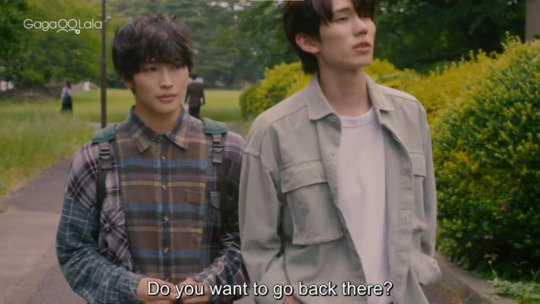
Y: あの いいんですか?
S: あそこ戻りたかった?
Y: いえ
Y: Um... is this okay?
S: You wanted to go back there?
Y: No
Y: いつも 友達に囲まれてるこの人が
なんでこうして 俺と一緒に歩いてるのかわからなくて
不思議だった
Y: This person, whose friends were always surrounding him...
I just couldn't understand why he'd walk together with me like this
It was a mystery to me.
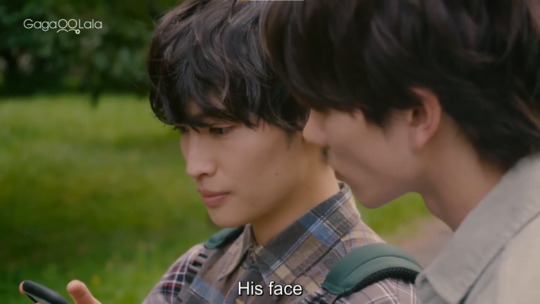
Y: あの顔が 信じられないほど近くにあった
耳元に届いた声の響きまで 良いものであることに
気づいてしまった
Y: That face was... so close to me I could scarcely believe it
And it dawned on me then
How wonderfully pleasing
Even the notes of his voice drifting pass my ears sounded
The scene in the library I've included right at the top, but I'm going to add the conversation that happens during Yoh's monologue, since the subs have them sort of mixed in.
S: 葉
S: 何してんの?
Y: え?えと、あの、本を探せて...
S: この本面白いよ
Y: え?
Y: ありがとうございます
S: また感想教えて
Y: はい
S: Yoh
S: What're you doing?
Y: Eh! Um, ah.. I'm looking for a book... (inaudible)
S: This book is interesting
Y: Eh?
Y: Thank you very much
S: Tell me your thoughts on it next time
Y: Yes
Segasaki's already dropped the polite suffix "-kun" behind Yoh's name here, and doesn't actually bother to let Yoh finish saying thank you before he tells him to report back about the book. Yoh on the other hand, is still using the full, formal and polite version of thank you, and answers him properly. Segasaki's taken the initiative to get closer to Yoh - he's already speaking to him like how he does in the present day (just, not roughly), but Yoh hasn't gotten comfortable enough yet to drop the formalities - or, he simply may not be sure if he can.
Navigating formalities and when to drop them is tricky, and requires some degree of social intuition. Generally speaking, Segasaki dropping a speech level should be a sign that it might be okay for Yoh to drop as well (not to the same level of course, just a little less formal) - but given how Yoh sees them as living in different worlds, and how fearful he is of being hated, it's unlikely that he'd want to touch the status quo.
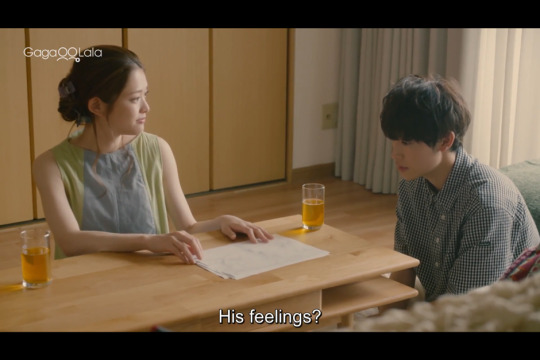
Y: あの人の気持ち?
Y: That person's feelings?
Yoh's pretty much stuck to the phrase "that person" when referring to Segasaki this whole episode, even during his flashback. He tends to do this when he's feeling some distance between them (like in Ep 2).
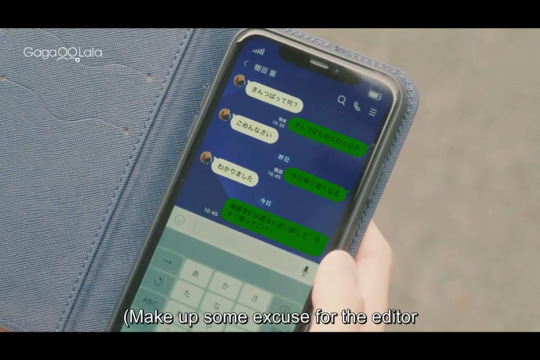
On screen messages:
Y: What is Kintsuba?
S: You don't even know what Kintsuba is?
Y: I'm sorry
[Yesterday]
S: I'll be back late today
Y: Understood
[Today]
(unread)
S: Just give the editor some kind of excuse, and come back right now
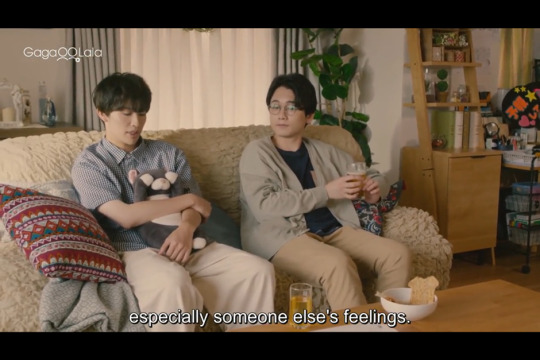
A: 随分 追い込まれてたねぇ
Y: 気持ちを言葉にするとか あんまりしたことなくて
Y: 他人の気持ちなんて なおさら
A: You've pretty much been cornered, huh?*
Y: Putting feelings into words and all... I've never really done that myself...
Y: Let alone (doing that for) another person's feelings.
*This is in reference to Man-san asking Yoh to write out Segasaki's feelings
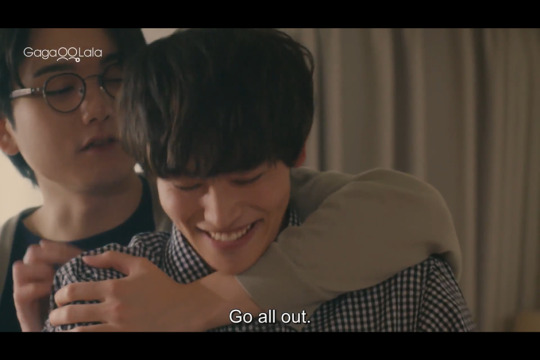
A: めちゃくちゃにしてやる, めちゃくちゃにして..x10
A: Gonna mess you up, mess you up... x 10
Yes, this does sound like a line straight out of a bad Jp AV 🤣🤣. I mean, we're talking about scenes from Man-san's manga right? That they had to mosaic out? 🤣🤣
Now you know why Segasaki is pissed.

S: 可奈美さんも一緒に仕事してるんですか?
M: すみません!瀬ケ崎さんにご報告もせずに進めてしまって
S: いや、可奈美さんのせいじゃないですよ
S: Kanami-san, are you also doing your work together with him?
M: I apologize! We ended up moving forward without even alerting you about it!
S: No, it's not your fault, Kanami-san
You can tell Segasaki has misunderstood here - he thinks Man-san has also been called to work at this Editor's place, and is completely not listening to what she has said, hence her ?? reaction 🤣

S: あ、すみません
急用ができてしまったので葉を迎えに来ました
S: Ah, I apologize
An urgent matter arose, and so I've come to pick Yoh up.
Segasaki's being quite formal here, but this is not the way to be polite. The "proper" way to request leave to go home early on behalf of someone else would be to first, apologize specifically for the disruption, introduce yourself and your relation to that person, apologize that an urgent matter has come up, regrettably but firmly insist that said person must return home immediately on pain of death, apologize again for all the trouble caused, promise to make up for it, humbly ask for understanding, and then apologize your way out the door.
So yes, despite the polite word forms this is quite rude, and is so far removed from Segasaki's usual "public mode" that it cracks me up. Segasaki's composure is unravelling by the second in these next few scenes - he is pissed and absolutely does.not.give.a.shit. 🤣

From right to left:
S: So, this bastard is the famed Editor huh...
S: Don't you dare try to deceive and pull tricks on Yoh!
S: The hell you doing touching him like that so freely!!
A: Who (is this)?
The language gets progressively ruder the more the speech bubbles get pointy and the larger the font gets🤣🤣

M: 瀬ケ崎さん やっぱ強いわ~
M: Segasaki-san really has a strong presence after all~
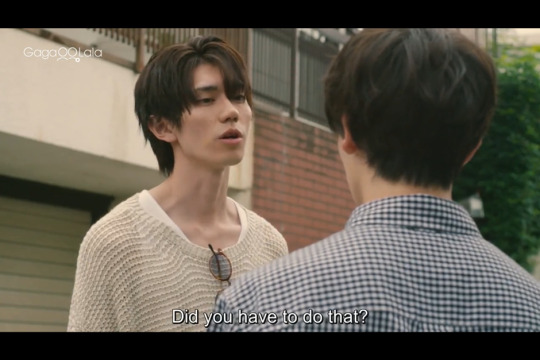
Y: 黙っててごめんなさい*
S: あのさ
Y: はい
S: ああいうのがいいわけ?
Y: え?
S: 俺より あの男のどこがいいわけ?
Y: I'm sorry for keeping this from you!*
S: Tell me
Y: Yes
S: Is that what you like?
Y: Huh?
S: Compared to me, just how is that guy better?
*Yoh uses the full but informal version of "sorry" here - gomen nasai. Making a note of this here so I can come back to it in one of the analysis posts.
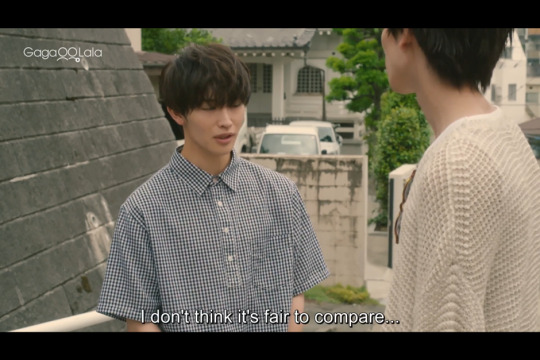
Y: え、いや
Y: 比べるものじゃないと思うけど。。
S: あるんだろうが 俺より いいところが
S: まあ、納得する理由がない限り俺は認めねえけどな
Y: 強いて言えば 優しいかな*
Y: 人の話を ちゃんとじっくり聞いてくれるし
Y: Um, no...
Y: I don't think it's something that can be compared...
S: There is something, isn't there? Some way in which he's better than me
S: Though, unless you give me something I think is reasonable I won't accept it
Y: Well if I had to say something then... maybe, he's kind?*
Y: I mean, he listens carefully and attentively to what someone has to say...
*優しい (yasashii) - often translated as "kind", it encompasses the ideas of "caring", "tenderness", "thoughtful/considerate", "warm/gentle". It's often a trait people say they look for in their significant other.
This word has come up often to describe Segasaki - in Ep 2, Segasaki uses it to describe himself, in Ep 3, Yoh uses it to describe Segasaki's voice, and of course here in Ep 6, red shirt uses it to describe Segasaki again. Even when the word isn't said out loud, a lot of Segasaki's actions would fit this word - In Ep 2, when he picks up after Yoh and comforts him during their not-argument. In Ep 3, when he passes Yoh his gift, and implies there's nothing to be sorry for. In Ep 4, the way he coaxes Yoh. In Ep 5, when he takes care of Yoh. In Ep 6, he speaks up for Yoh in the cafeteria when he doesn't have to, when he goes to help Yoh. The irony of this moment is that Segasaki puts in a lot of effort and probably does pride himself in being yasashii, and he listens to Yoh better than Yoh listens to himself, and yet he hears from Yoh that he isn't yasashii or attentive, which explains the pained expression on his face.
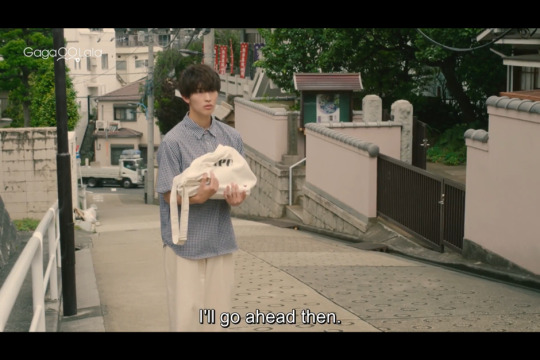
S: あ、そう
S: 俺先行くわ*
S: Oh, is that so?
S: I'm going ahead then*
*わ (wa) - this ending particle puts emphasizes one's statement, but is not one that Segasaki usually uses. It's less forceful that his usual speech, because he's quite hurt by Yoh's statements.
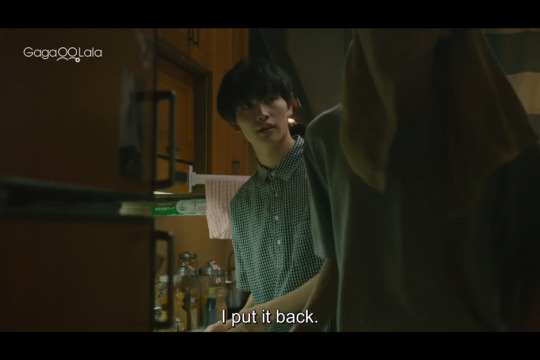
Y: かばんに入ってたやつ 戻しといてから
Y: The thing that was inside my bag, I put it back so...
The way Yoh ends this sentence leaves room for a follow up - it's an invitation to continue the conversation, which we actually have not seen him do with Segasaki, and that's why he looks so dejected when Segasaki rejects that invitation by walking away.
Though it's been hinted at throughout the show, Ep 6 is where we get confirmation that Yoh's just never quite fit in with the crowd, and that Segasaki has always been in the center of it. The stark difference explains why Yoh is so afraid that one day he will do something to make Segasaki hate him, and why he reflexively rejects the idea that Segasaki could possibly love him.
This episode is painful, for both of them. For Yoh, because from the intensity of his monologues, we finally get a sense of how big a presence Segasaki is to him, and therefore, how devastating it would be to lose him. For Segasaki, because for all that he can read Yoh, for all that he has done to try and reassure Yoh of his love, he still cannot make Yoh see, cannot make Yoh hear.
"If he ended up hating me then I felt like I might die."
It is precisely Yoh's love for Segasaki that makes Yoh fear the possibility of losing him, and it is that fear that blinds, deafens and mutes Yoh to the very thing he hopes for. And it is in trying to protect himself, that he inadvertently hurts the very person he loves so much.
#my personal weatherman#taikan yohou#体感予報#MPW subtitle corrections#mytranslations#segasaki x yoh#Ep 6 has given us a lot of context about these two#and reinforces again that it doesn't matter what Segasaki might say or do#Until Yoh sees the good in himself#he's not going to overcome that fear#Segasaki literally gives up his best ability here#he let's his composure slowly unravel throughout this whole ep#he loses the very thing that triggers Yoh's feelings of inadequacy#and yet Yoh doesn't even notice#ahh this is what happens when you love a “my pace” person
151 notes
·
View notes
Note
Uh, I wonder where those subs for the final episode are from? Because segasaki doesn't say 'i like you' at any time, does he, and yoh doesn't say it back, either, right? Of course they kind of doooo but actually don't
Hi hi Anon!
I still haven't watched the fully subbed Ep 8 yet (still working on Ep 6 😅) so I'm not sure which sub you're referring to, but you're right that they do but also, sorta don't 😂 - this is likely to be a stylistic choice from the scriptwriters/directors, because Japanese is a language where ambiguity shines (just like how Segasaki tapped Yoh on the forehead and then said "this is mine"), and sentences with "double meanings" are frequently used in manga and light novels (writers will indicate that a certain kanji with one meaning should be read in another way, thus conveying 2 meanings at once).

Around 07:10, Yoh says:
好き...かも
(I do) like (it)... maybe...
It's said after his inner dialogue where he admits Segasaki's actions does make him happy. The "pause" in the conversation makes it easy to interpret this as "Maybe I like you" - since there are actually no pronouns in the sentence. However, if you consider the spoken lines before this, after Yoh asks what Segasaki thinks is good about him:
S: こういう意地悪されんのがすきなとことかじゃね?
Y: 適当なこというな
S: 好きじゃん
[inner dialogue]
Y: 好き...かも
S: Is it not this part of you that likes being teased like this, and things like that?
Y: Don't just say things so carelessly
S: (You) do like (it)
[inner dialogue]
Y: (I do) like (it)... maybe...
So yes Anon, I do believe that Yoh's line was meant to be interpreted both ways, as you said, sorta did but sorta didn't. This show is quintessentially Japanese - it's not meant to be taken at face value, the beauty is both in the lines themselves and the spaces in-between.
(Of course, there's that whole bit where Segasaki reads the manga out loud to Yoh)
#my personal weatherman#taikan yohou#segasaki x yoh#mytranslations#my answers#i'm working on Ep 6 right now I promise!
50 notes
·
View notes
Text
My Personal Weatherman and the D/s element Ep 8
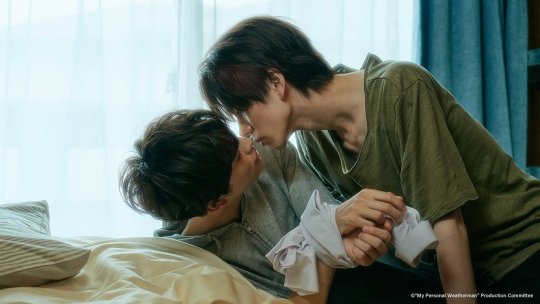
It's the last episode. I'm excited and sad. For those that haven't read my other episode break-downs, they can be found here.
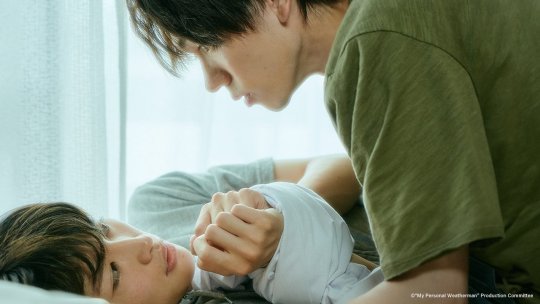
The side eye that Yoh gives Segasaki is wonderful. So full of WTF.
First, let me explain that sub scared is not the same as scared scared. For some, that uncertainty and fear isn't something they want to escape from. Never once do you see Yoh truly fight. Let's be honest, homeboy is being sweet, pretending that a shirt could really keep him tied up.
Segasaki is laying down the guidelines. Ahh, and then he realizes that he doesn't want a slave. He's back tracking. This is good evolution for an organic D/s relationship. See how loose that shirt is when Yoh grabs Segasaki. That thing is threatening to come undone on its own.
Ohhh not only is Yoh agreeing to the guidelines, but they are communicating. Nice. Same Segasaki, same. That's exactly how I would describe myself. Aww, the shy cute baby making a move on his Dom. But damn does his Dom like it.
See! See! What did I say about subs? They like that feeling that is like, right before a roller rolls down. Damn, this is hot. Segasaki knows Yoh likes it. Yoh is being a little brat, giving that typical push back because he likes the no, but he's being careful to not push too much because he doesn't want Segasaki to actually stop.
See doesn't really want him to stop.
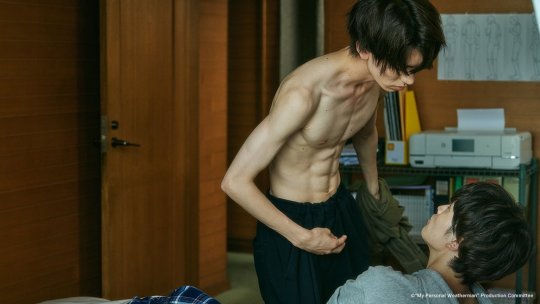
Yoh trying to explain or understand, but Dom's protective instincts have been activated. His sub baby is sick.
OMG! Mickey and Minnie are the best! "Try to use more thought in forming your words." DEAD!

Segasaki's smile! He is so happy to finally understand what Yoh needs from him. Bless it, though, his man is dense. 🤣🤣🤣 Welcome to my life Segasaki, welcome to my life. My man is so fucking smart but so fucking dense. But they are ours, right.

He is cooking curry and it looks awful! 🤣🤣🤣
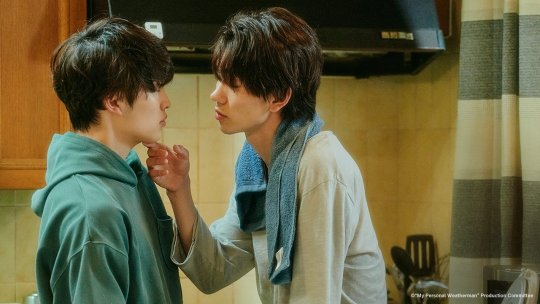
Segasaki is setting up more guidelines! Even talking reward! This is so cute!
Oh!!! Okay, so this may be confusing to some. Segaski asking Yoh to wait for him at the door and greet him when he get home, but this is actually a big thing to many Doms. Let me explain. So, the Dom of the house returning home, it's a significant part of everyday life. When the Dom returns home and closes the door, the D/s couple, who are often not public, can truly be themselves. It’s an important moment to help activate the subservient role, reconnect with each other, and reinforce the dynamic. It's an intimate bond building moment for both parties.
You are seeing it in action. Both parties are getting their needs met and creating a stronger bond. A relationship if not nurtured becomes mundane but with this small thing, you remind each other of how important you are to one another. It's saying, I will put in the effort because I care, value, and respect you. Imagine receiving that message from your loved one every day.
Then the curry. Ahhh, Segasaki is so happy. These two worked a lot of things out. I loved watching it. And now we've come to the end. I'm gonna go re-watch because I love it! I hope you guys enjoyed this. Thank you for taking the time to read it. Hit me up if you have any questions. 💜💜💜
#my personal weatherman#segasaki x yoh#taikan yohou#thank you Luta!!#been such a delight reading your breakdowns of this show#i love your breakdowns always but with this pair in particular I've enjoyed your explanations so much#i especially love how you point out how organic everything is#i don't want to say goodbye yet#i love these two
278 notes
·
View notes
Note
Hi! I read your post about amae recently and I wondered something in regards to Segasaki and Yoh (MPW).
(Spoiler ep 8!)
Segasaki asks Yoh to wait at the door and greet him when he gets home from work. Though Yoh is confused he recognizes that it's something that would make Segasaki happy. He then takes the initiative to say the greetings in the kitchen, giving his anwer to the request. Is this Yoh recognizing Segasaki's amae?
Hello! Thank you for reading my post 😁 And yes it is! Specifically, asking Yoh to come to the door regardless of what he is doing, is the amae part (plus, the way Segasaki says it). Standard greetings like okaeri and tadaima (see Ep 3's post for more) are what make coming home feel like, well coming home. They're a very common part of everyday life - but Segasaki doesn't say "I'm back". Yoh has said "welcome back" before - but only after Segasaki comes to look for him.
Ep 8 is when Yoh finally recognizes Segasaki's amae - In fact, Yoh specifically uses the word "amae" when he does realize it, though I'm pretty sure it wasn't in the subtitles (I haven't fully watched the subtitled version of EP 8 yet).
Since it'll take me awhile to get to Ep 8, I'll just do this part first, because it looks like the subtitles make it a little harder to tell that he's amae-ing.
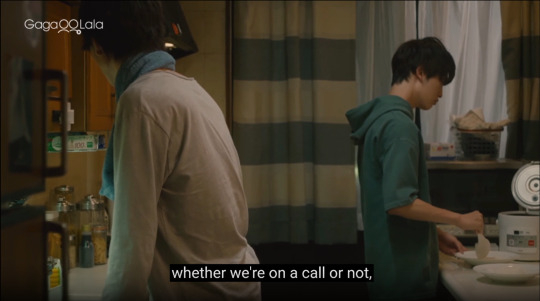
S: その代わり
S: 俺が帰ったら通話中だろうが何だろうが
S: 玄関まで来い
S: んで* おかえりっていえ
Y: そんなこと** してほしかったの?
S: 悪いかよ?***
Y: 別に悪くない
S: Instead of that,
S: When I come back, whether you're in the middle of a call or doing whatever else
S: Come to the front door
S: and then*, say "welcome back"
Y: Is that something... you've wanted me to do?**
S: (You mean) I can't (want that)?***
Y: No... there's nothing wrong (with that)...
*Segasaki uses a shortened, informal version of "and then" here, and together with his muttering, and his unwillingness to look at Yoh, he sounds like he really doesn't want to have to admit this (though, he still sticks to his rough speech 🤣).
**Yoh's phrasing here makes it sound like he's genuinely surprised that Segasaki wants this, because, like I said earlier, it really is something very simple that most people would take for granted.
***悪いかよ - Literally "Is it wrong?", with an ending particle that indicates this line is a challenge, except for the fact that he says it so tentatively.
Y: 本当よく分かんないやつ*
Y: そんなことでうれしいの?
Y: おかえり
Y: お仕事 お疲れ様**
Y: 玄関じゃないけど
Y: Really... such a difficult to understand guy*
Y: Would something like that... really make him happy?
Y: Welcome back
Y: You've worked hard at the office**
Y: Well, it's not at the door though
*Yoh uses the informal word やつ (yatsu) to refer to Segasaki here, which he's never used before. Depending on the context, it can be considered rude, though is often used casually amongst male friends. In this context here, it's used to express affection mixed with mild exasperation.
**お疲れ様 (otsukaresama) - standard greeting; full version "otsukaresama desu/deshita". Literally means "you're tired/you've worked hard" and is an acknowledgement of the effort someone has put in for the day, more than it is some sort of praise or commendation. For eg, Yoh says this to his lousy editor in Ep 5 😅
That said, the way Yoh says it here is very sweet, adding the honorific prefix "O" to the word "shigoto (work/job)", and then tacking on the polite version of this phrase, "otsukaresama". Remember when I talked about the different definitions of sunao in the amae post as well? I mostly talked about Yoh not being able to be honest/straightforward with his own feelings, but the other definition of sunao describes an attitude/behaviour towards other people. That definition is usually translated along the lines of "cooperative/obedient/deferential" (note that these words sometimes carry a negative connotation in English, which is not so in this particular usage of the word in Japanese here). This is Yoh being the very picture of sunao here. It's adorable and sweet and it's no wonder Segasaki jumps right on him 😂
---
Thank you for your question! I'm really happy to know that amae is starting to be a little more understood, since it is quite a common phenomenon in many JBLs :))
#my personal weatherman#taikan yohou#体感予報#segasaki x yoh#my answers#mytranslations#nooo it's over it's really over#i don't want to say goodbye yet#i love them so much#oops this got long again hahaha
46 notes
·
View notes
Note
Dear Luta, I'm going to take the liberty of hopping in on this one since I was tagged in the ask 😁😁 I hope you don't mind! (thanks @bloglouuniverse-blog1, glad you liked it!)
This got long - tl;dr at the end!
I just want to emphasize again that many aspects of East Asian culture will appear to the Western eye as something different than what it really is because we have grown up internalizing different societal "truths", and some of these are so fundamental that we do not realize how they shape our view of the world. (This post is going to go back to that independent vs interdependent self construal)
It is not uncommon to see the comment that one partner "infantilizes" the other in East Asian dramas. Amongst mixed race couples from Western & Eastern cultures - it is also not uncommon to hear the complaint that the Western partner felt like they were "being babied" or "had to baby their partner".
The reason this happens is because Western society, in general tends to have a very flat hierarchy. As such, many people do not have much of a frame of reference when it comes to close relationships in which there exists a power imbalance, except for the parent/child dynamic, or the teacher/student. Even then, many Western parents and teachers want to "become their child/student's friend". There is nothing wrong with this - along with individualism and independence, these are aspects of Western society and culture. All it is, is different.
But when you have a hammer, everything looks like a nail. So when you introduce power dynamics into a relationship, many people automatically think "who are you to tell me what to do? My parent?". And because of that link to parental relationships, power dynamics in any other kind of intimate relationship can feel, well, uncomfortable.
In East Asian culture, power dynamics are introduced to you before you can even talk. Between you and your siblings, you and your cousins, you and your uncles, aunts, your neighbours, the old man down the street, the random kids at the playground, your seniors in school and your teachers. Even twins less than a minute apart, will still be referred to as "older/younger". Literally with every other person besides you, exists a power differential, and you will be taught to recognise and navigate that differential, because it is a fact of life. Again, there is nothing wrong with this - along with the emphasis on the group and on interdependence, these are just aspects of East Asian society and culture. It is just different.
I must also stress, that power imbalance =/= abuse of power. Yes it happens, but it happens when things go wrong. The reason for this confusion is again, the lack of a reference frame. The parent/child and the teacher/student dynamic in Western culture, is linear. The parent/teacher holds the power, and the child/student is relatively powerless. When the child comes of age, he leaves. There is no expectation nor obligation for the child to return, because the role of the parent and teacher is generally seen as temporary. They are there to help the child survive, and when the child grows into an adult, he makes his own way.
This is not so in East Asian relationships, which are bidirectional and reciprocal. This means that both partners have a role to play and obligations to fulfill, no matter their position in the hierarchy. Those roles and obligations may change as both parties grow - for example, the child is expected to care for the parents in their old age - but both parties will always have something they are meant to contribute. It is easy to see that the older/more experienced person will care for, guide and correct the younger/less experienced person - but most people miss that, in return, the latter not only cares for the former, but also offers their respect in learning and their humility in receiving guidance.
You might be wondering how those things are important, given that they aren't even tangible objects to begin with. Remember when I said relationships are co-created by 2 interdependent individuals? This is what I mean. It takes 2 hands to clap - there is no "higher position of power" if the "lower position of power" does not exist, and vice versa. The existance of one justifies the existance of the other. It is the existance of the child that turns the person into a parent; it is the student that turns the person into a teacher. We are all defined by who we are in relation to one another. It's all very yin and yang isn't it? 😁
Tl;dr:
What this all means is, in the West, to love someone is to preserve their independence and individuality, because it is their uniqueness that gives meaning to who they are.
In the East, to love someone is to reinforce the relationship you have with them, because it is the relationship that you both share that gives meaning to who you both are. This is why amae is so important.
In other words, there is a lot more going on than just Segasaki leading/correcting/guiding Yoh (and part of Yoh's growth is his realization of how he too brings meaning to Segasaki's life).
Dear Lutha,
Thank you very much for your kind and quick response to my previous (and very first) question, which was about 'caging' in D/s relationships. I really enjoyed it and I'm looking forward to reading your post on the topic.
Since I appreciate your thoughts so much, I am writing to you on another topic. In some dramas with strong D/s elements (such as Cutie Pie, Love in the Air, My Personal Weatherman, You are mine and even sometimes in KinnPorsche), infantilization dynamics are to be seen. This element is all the stronger as the age gap is marked, even though it can still show up anytime.
I'm not necessarily talking about the Dad/little dynamics, but of a more general Adult/minor type relationship, where the former leads and protects the latter through the usual parental tools (like scolding, giving lessons, correcting, punishing, rewarding etc.. .).
For me, this pattern is for example very strong in a series like My Personal Weatherman, where Segasaki assumes a parental role towards Yoh, who often acts and speaks like a child (either spontaneously or in reaction to his partner's attitude). If I understand them correctly, @notfreetoday's detailed and fascinating posts on language(s) in My Personal Weatherman tend to validate this impression.
So, I wanted to ask you a/ if you would also describe parts of these relationships as consensual infantilization and, b/ if so, if they are in your opinion different from common D/s dynamics. Or whether they should be seen as a particular expression of a mere D/s dynamics.
If you have time, I would be happy to read your thoughts on this matter. Thank you once again for your delightful posts.
Best,
Yassa
Hey Yassa!!!
I'm so glad you enjoy my writing. It means a lot!
"Where the former leads and protects the latter through the usual parental tools (like scolding, giving lessons, correcting, punishing, rewarding etc...)."
Labeling discipline as infantile is limiting. We use corrective tools even in the work place. If you mess up then you get scolded, given a lesson, correcting, and so on. We all need correction at any stage of age. It just depends on your hierarchy on how that correction is given. With a D/s relationship, the hierarchy places the Dom at the top. Therefor, if a Dom just like a Boss is found to be wrong, the consequences will be far different from those given to a sub or subordinate. It's an imbalance in power control.
However, I think I'm capturing what you are really trying to ask. All the shows you just mentioned are BT/b relationships. Which is a D/s relationship involving a Brat Tamer Dom and a brat submissive. This is the type of Dom that I am. We are typically very cool, calm, and collected. We are protective but much more loose on the leash than other Doms. We will often engage in romantic play or play fighting, but push us too far, and you will see an intensity in us that will send shivers down your spine. Regardless of how gentle we seem, we will gladly give it to you if you deserve punishment. Due to our submissives liking to push our buttons, you'll see a more tug of war relationship. Depending on if we want to get ahead of it or let it play out is how you'll see us lead. Which is why you see more disciplining in a BT/b relationship.
The Brat Submissive - Brats in general are overly-aggressive, sarcastic, sassy, and your general coyote. They have no intentions of submitting to anyone's authority or discipline if you have not earned their respect.
The SAM Submissive - The SAM is a type of brat. A SAM type submissive, also known as a Smart-Assed Masochist, is just that, a smart-talking submissive with a quick tongue. Usually, their Sammie behavior isn't actually a cry for attention; it's just their way of being playful. In fact, most SAMs when actually threatened with punishment will back off, saying that they were only playing and that they didn't mean anything by it. Occasionally, this behavior can be incredibly frustrating to their partners, but the rewards far out weigh the negatives.
My Beautiful Man: Starts out as M/s which is Master slave and moves into a deep D/s. No BT/t in this relationship.
Not Me: This is a soft D/s relationship, but it's there. White is a little bit of a brat but much more subservient.
Love In The Air: Very much BT/b relationship. With a Primitive Brat Taming Dom and SAM submissive.
Until We Meet Again: I recommend this one for seeing the difference between a deeper D/s relationship that is Dean and Pharm. In comparison to Win and Team who are BT/b.
Between Us: WinTeam's story. Brat Tamer with a SAM submissive. The difference in Team is that he is a Dom outside of their relationship. So what is called a Sexual Submissive Only.
I Will Knock You: Deep D/s with large age gap. The youngest being the Dom.
Stay By My Side: D/s relationship with a stricter Dom but a brat of a sub.
My Personal Weatherman: A Deep Brat Tamer with a brat submissive.
Hope this was helpful! 💜💜💜
83 notes
·
View notes
Note
I've done up a timeline here if you'd like 😁
what Yoh said in the first ep is that segasaki proposed 3 years ago but they've been living together for four months now
Thanks so much! That makes WAY more sense
23 notes
·
View notes
Text
Not sure about the sketches, but the doujinshi that Man-san and Yoh made is drawn by a different manga artist, Toshima Awako, who also draws BL, and is a good friend of the original artist Taino Nikke.
Tai-sensei asked Awako-sensei to help 😊😊
So I'm finally getting around to pull some screenshots so I can talk more in depth about Yoh's drawings maybe... and I just think it's kind of funny that I spent the last half hour skipping through several episodes ignoring the 'sexy' parts so that I could find the split second glimpses of Yoh's drawings. I just think that's funny.
Also...I have yet to watch the behind the scenes stuff, but I'm wondering if we know who draws Yoh's sketches, or any of the art on the show. I had assumed that the artist who drew the original manga drew the sort of background bits of manga in progress by Yoh and Man-san, and I guess it's reasonable to assume they drew the sketches too. But I'm curious, if anyone knows.
#my personal weatherman#taikan yohou#so I'm kinda sorta really hoping we get this little doujin too!#i hope it's not just the cover!
13 notes
·
View notes
Text
MPW Timeline
So, in the most recent behind the scenes video (vol. 11), Atsuki mentioned that Segasaki and Yoh's meeting takes place 5 years ago. I've been trying to figure out the timeline of everything and think I've got it (deductive reasoning under the cut)
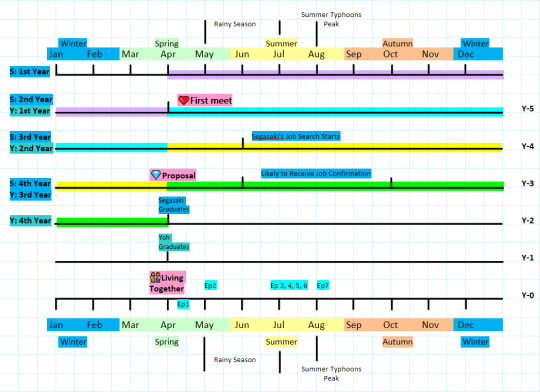
We know from the show itself, the BTS and the manga artist:
5 years ago: First meeting
3 years ago: Proposal
Just over a year ago: Yoh pulled Man-san into the Segasaki Fandom
4 months ago: Started living together (around Mar/Apr)
We also know from the weather reports/contextual information that:
Proposal was on a day where "it was unusually hot for the season" - Either Spring or Autumn
Ep 1 ends/Ep 2 starts with the start of the rainy season - ~ May/June
Ep 3 - Rainy season is ending - ~End of July/Start of August
Ep 4 - 6 - Summer ~July/August
Ep 7 - Very hot weather, with a Typhoon - Summer Typhoon ~August
When was the Proposal?
To become a meteorologist in Japan, the usual route is to study related subjects at university (4 years), and then take the national licensing exam (which has a pass rate of about 4-5% btw). This exam can be taken whilst in university too.
We know that during Segasaki's proposal, he was pretty confident about getting a high pay, so it's likely he already had a job offer by then. The academic year in Japan starts in April, and the average Japanese university student will began preparing to enter the job search (yes this is An Annual Event, like the great migration 😅) around June of their 3rd year. After internship, interviews etc, job confirmations and contract signings will usually come around Sep/Oct of their 4th year. So, my guess is that Segasaki completed the licensing exam sometime before he started his job search, probably did pretty well during his internship and interviews, and so was pretty confident that he'd get signed even before he received any confirmation. This puts his proposal to around the end of his 3rd year to before Oct of his 4th year. Given that the day of the proposal was unusually hot, we're probably looking at Spring, aka Mar/April/May, which fits with the end of his 3rd year/early 4th year.
When did they first meet?
So, if they met 5 years from "now", then that would be 2 years before the proposal, putting Segasaki at the end of his 1st year/early 2nd year. Given that Segasaki is Yoh's senior in university, and the clothes they're wearing, I'm guessing this is sometime in April, ie the start of the new academic year. Thus, Segasaki has just started Year 2, and Yoh has just started Year 1.
When did they start living together?
Since they are 1 year apart in terms of school years, then it is likely that Yoh graduated 1 year after the proposal, which leaves us with an additional 1 year after his graduation where he was likely living alone/wherever he was during school, before he moved in with Segasaki. This was the time he introduced Man-san to Everyday Weather (the shot of him is so tight you can't really tell if he is in Segasaki's house or not, but if my math is math-ing right, then he probably isn't).
#my personal weatherman#体感予報#taikan yohou#segasaki x yoh#this is my best guess#what happened during that 1 year after Yoh graduated!!#Let's have a S2 showing all of that!!#Did Yoh try to find a job and then decide to take Segasaki up on the offer?#or did Segasaki want to wait till he was a little more secured in his position?#I feel like both are plausible#but Yoh also said they didn't date before this so#what were they doing!
189 notes
·
View notes
Note
@lurkingshan Filial piety! I just want to clarify that this doesn't mean blind obedience, even though in many Asian cultures, many parents still believe that it is, and weaponize this concept to guilt-trip their kids. The basis of filial piety should be gratitude - for being brought into this world, for being raised and cared for. But that requires a key thing - that your parents actually did their job, and cared for you. If your parents were shitty, then you do not owe them your piety. The problem of course, is how "shitty" is defined, and by whom. The societal pressure to demonstrate filial piety comes from the assumption that all parents love and care for their children - because that is the other part of the equation - parents have an obligation to care for their child. The parent who abuses the child is equally condemened as the child who abandons the parent. There is a bidirectionality and reciprocrity in a lot of Asian relationships that is not often seen because the power imbalance is often seen as an abuse of power (and unfortunately, we are all humans, and abuse of power does happen).
@he-is-lightning-in-a-bottle I admit I am less familiar with Korean culture - but since Japan was also mentioned, I thought I might chime in!
Understanding that someone is drunk, and acknowledging that it might not have been their choice to become so, is still different from actually approving it.
It's not so much that these behaviours are forgiven, but that they are tolerated. The Japanese word "to forgive" (許す) also means "to allow/tolerate". The general feel is "There's nothing that can be done about it" ("shikata ga nai/shouganai" in Japanese, though similar phrases exist in Chinese and Korean). It is still seen as unseemly, and people don't like it. You'll often hear people lamenting that someone's gotten so drunk they've either passed out or can't get home alone, and now they have to do something about it. This is considered a nuisance - but people still help a colleague home so the colleague isn't a nuisance to others, or because they have to, out of social obligation. Those that you find passed out on the street are judged, for sure, but silently. Maybe the person is a salaryman on a solo business trip, or maybe this person just isn't well liked enough for his colleagues to help him get home. A passed out drunk isn't a moral failing for sure, but they are a nuisance and an eyesore that people tolerate, because that's just how it is. (I know it sounds harsh, but this is the reality)
Alcoholism on the other hand, is treated exactly the same way.
To (somewhat) marry both of these topics, let me introduce a Chinese drama - The Bond, or 乔家的儿女 (The Qiao Family Children). The show is about 5 siblings, and their whole life from childhood to adulthood, marriage and divorce. The father in this show is one only in name - he is irresponsible and selfish, drinking and gambling away the family's money. The eldest son takes up the father's role instead (another commom theme) and there are some poignant arguments in the show. The children still provide him with food, and they still eat together, but when he demands to have a say in one of their marriages, the eldest son explodes at him, saying that he has never done anything for the family, cared for them or even disciplined them, and he has no right. Towards the end of the show, he all but cuts ties with the father. It is difficult for him, even then, but he does it for the rest of his siblings. He does not owe his father any filial piety, because his father has never fulfilled that role. His tolerance of his father, and his provision for him, in the beginning, is what marks the eldest son as a 君子 (junzi - often translated as gentleman, but truly means a learned person, someone who understands and sees the big picture) - he does that out of benevolence, because he is the bigger person, not out of filial piety.
I've heard that non-Asian viewers sometimes are surprised by certain behaviours or thought processes (cultural differences) in Asian media when they first start watching Asian shows. Were there any ones that really jumped out at you?
Good question! The short answer is: absolutely, so many.
The long answer is that I think about this all the time and am still constantly learning. I discuss this very often with @waitmyturtles and @neuroticbookworm. I have a very Western mindset and am a fiercely independent person even by Western standards, so I have to constantly remind myself about the collectivist mindset in Asian countries and reframe my own reactions to a lot of the story and characterization choices in Asian media.
I'd say one that I personally struggle with most is the concept of filial piety and elevation of parental authority over one's own well-being. I have cut ties with an abusive biological parent and their toxic larger family, and I have zero guilt or shame about that. For me, it was the right thing to do and if that family ever comes knocking asking me for support they will be turned away without a second thought. But this decision, which felt so natural for me and is culturally acceptable where I live, would be unthinkable in many Asian countries. This came up for me a bunch when I was watching Go Ahead (an all-timer, if you haven't seen it yet run do not walk) and one of the best parts of that watch experience was getting to really feel and understand the vastly different cultural expectations put on a young person living through an analagous situation. Each time I got angry at the choices being forced on these characters, I had to step back and consider their cultural context, and then dig into what the story was trying to communicate about the damage those expectations can cause.
I also discussed this quite a bit with bookworm when we were recently watching I Promised You the Moon together. She is very rooted in an Eastern perspective on expression of emotion (she is more touched by restrained displays where you can tell characters are holding back where I tend to respond more to big emotional outbursts; she responds well to ambiguity in story resolutions where I like for things to feel more definitive), so we sometimes had opposite reactions to scenes and different aspects of the story touched us. We spent a lot of time unpacking it and now like to observe our different preferences when we watch stuff together and think through what it says about the social, spiritual, and broad cultural norms we were raised with on opposite sides of the world.
I have been watching Asian media for years and I still learn new things every day (right now I am watching a Taiwanese drama that is introducing me to an indigenous culture I had no prior familiarity with and I'm learning a bunch), and I try to approach these shows with curiosity first. I think being open to that kind of learning and maintaining willingness to step back from your instinctual reactions and adjust your perspective is especially crucial when you are engaging with media from outside your home culture.
97 notes
·
View notes